The Samohi
Wednesday, February 14, 2024 | Santa Monica High School | Volume CXII - Issue IV
Banned books find a home at Samo, CENTERSPREAD PAGES 8-9 | Music: Out with the new in with the old - OPINION, PAGE 6
 Photo by Manny Lopez
Cover by Taylor Witt
Photo by Manny Lopez
Cover by Taylor Witt
What’s going on around Samo?
This past December, a Samo engineering team placed fifth place at the national NASA Jet Propulsion laboratory (JPL) competition in Pasadena.
Every year, JPL releases an invention challenge for highschoolers to design a device to complete a
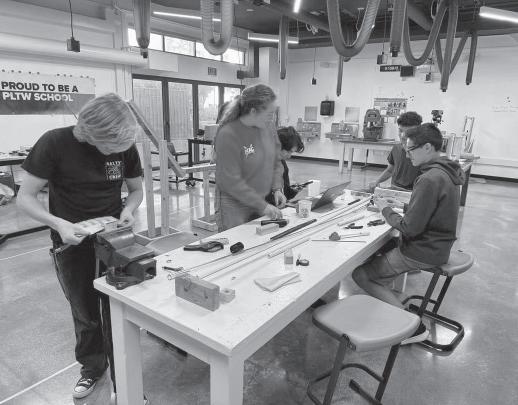
specific task. While all teams in Samo’s engineering class qualified for the national competition, Team Grievance North America, composed of Gigi Bazyler, Miles Bhattacharya, Tia Hansen, Alex Moses, Kyle Spiteri and Sam Davidson’s fifth place finish was the highest of the three.
“We spent a lot of time planning with our teams, and building prototypes for the components used in devices,” Gigi Bazyler (’24) said.
Taught by Breanna Snyder, the engineering class works on developing different skills and knowledge for the real world. Students work in teams and groups to design and create different solutions, utilizing communication and critical thinking skills. The PLTW engineering program consists of four levels: Introduction to Engineering Design, Principles of Engineering, Digital Electronics and Engineering Design and Development.
Hazel Health, a new program coming to Samo available from home and at school, will provide free virtual therapy to all students in need,
This program was brought together by Samo after taking part in a needs assessment a couple years ago through the LA county office of education. The needs assessment found that despite Samo already having therapist options on campus, long waits require the school to hire more therapists. The LA county office of education offered Samo Hazel Health as a solution, which is a short term model of virtual therapy: around six to eight sessions with licensed therapists, accessible from home or school, will be provided. Using iPads currently in the nurse’s office, any students can refer themselves to Hazel Health. School advisors and therapists are also able to refer students. While the sessions will remain confidential, there will be adults around to help the students if necessary. Lotan Shuli, the mental health counseling coordinator at Samo, is excited about the new partnership with Hazel Heath.
“Safety is really important, when someone is having a session with a therapist in person and they are experiencing something very crisis level that therapist is going to handle it. However, when you have a therapist that is not in the vicinity, it is a whole other procedure,” Shuli said. “Students can self-refer. There is also a website for students to fill out which will soon be on the Samo wellness services.”

Samo’s Junior State of America (JSA) attended the yearly Winter Congress from Feb. 9 to Feb. 11. The Winter Congress imitated the primary elections, which are
College signing day commemorates student athletes
National signing day, which took place on Feb. 7 in the North Gym, commemorated Samo’s student athletes who signed to collegiate sports.
Nine seniors were celebrated by fellow teammates, coaches, parents and other students—Cassie Bibby, playing soccer for University of Southern California,
currently taking place nationwide. The Winter Congress is a yearly legislative simulation during a statewide convention for student members of JSA chapters across the country in Washington D.C. They met for three days and imitated congress, creating and debating bills and legislation. As citizens over the age of 18 are getting ready to vote for the upcoming general election, JSA is intent on preparing students to take part in the electoral process while giving them an enriching educational experience. Kara Best (’24) is one of the club presidents along with Dylan Cheah (’24), and alongside vice president Isis McDowell (’24).
“Our current goals as a chapter are to represent California well in the national convention and meet new people,” Best said. Best and Cheah were both voted best speaker in each of their debate blocks.
Darragh Flanders, playing water polo for Pomona College, Jasper Ford, playing lacrosse for the Dominican University of California, Ryland Hawkins, playing football for Willamette University, Oliver Keeves, sailing for Tufts university, Caden McCallum, playing football for Tufts University, Jayden Montanez,
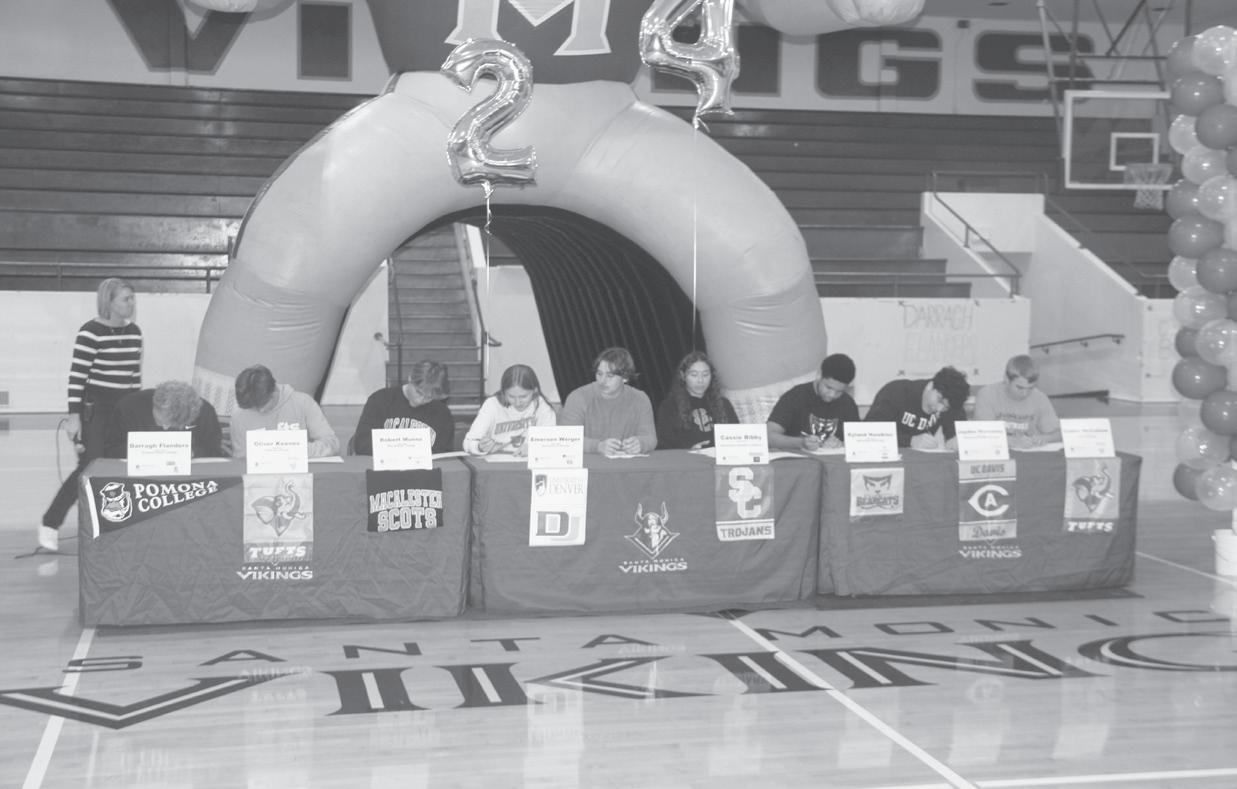
California’s 2024 ballot measures
The primary election on March 5 offers students of age to vote for national and statewide ballot measures at their nearest polling center or by mailed ballot.
Ballot measures are laws, issues or questions of both state-wide and local significance for voters to decide on. There are two ways a measure can be placed on the ballot. State legislatures can propose initiatives and 26 states including California allow residents to place measures by gathering enough signatures. Government teacher Adrienne Karyadi shares the purpose of ballot measures within elections,
“Ballot measures started as a way for the citizens to pass laws without waiting for the legislature to do it or for the executive to propose the law,” Karyadi said.
Currently, 11 measures on the California ballot affect issues ranging from income taxes to vote thresholds. As of January 23, 55 statewide ballot measures have been certified for elections in 2024 nationwide.

Karyadi gives an example of the significance of ballot measures for citizens and how it allows them to reflect their wants despite big corporations wanting otherwise about measures on previous ballots.
“There was a law passed [in the previous election] to limit the flavors that could be sold in vaping products in California,” Karyadi said. “The vaping industry put a ballot initiative on the ballot to try to overcome that, and by giving the state’s citizens a chance to vote on that, it made it pretty clear that the voters do not want there to be a market for those products.”
A ballot measure in this year’s election includes a lower Supermajority Requirement to 55% for Local Special Taxes to Fund Housing and Public Infrastructure Amendment, influencing the vote threshold for local special taxes and funding for housing projects and public infrastructure.
Another measure in the California election is Proposition 1, which aims to build mental
Editor-in-Chief Hawene Alemayehu
Managing Editor Sydney Roker
News Editors Sienna Bevan
Ryan Kim
Centerspread Editor
Aili Forster
health facilities and provide housing to homeless people. If passed, another 6.4 billion dollars will be spent on expanding mental health and treatment facilities within the state. 4.4 billion of those dollars will be allocated toward 10,000 treatment beds.
Students such as Willow Driver (’24) tend to find Proposition 1 and issues similar to be important because they can help those struggling in society.
“I think Proposition 1 is really important in this year’s election because it helps homeless people and creates funding for more mental health facilities so Samo students who are eligible to vote should look into that and everything else that is on the ballot this year,” Driver said.
Another ballot that has become eligible for the California 2024 election is the 18-dollar minimum wage initiative. This measure will raise the state’s minimum wage to $18 per hour instead of $16 per hour. This measure impacts working Samo students and other minimum-wage workers in the state.
Opinion Editor Nika Nazarizadeh
Sports Editors Cleo Topp
Matilde Martinez-Navarrete
Student Life Editor
Emi Yamashiro-Herget
A&E Editor Sara Javerbaum
Art Editor Audrey Strauss
Photo Editor Taylor Witt
Faculty Advisor Elizabeth Stapleton
playing football for the University of California, Davis, Bobby Munoz, playing baseball for Macalester College and Emerson Werger, paying volleyball for the University of Denver. Every student was recognized individually, as their coaches came up one by one to speak on each of their athletic achievements.
Caden McCallum, who played on Samo’s varsity football team as running back and linebacker, is excited to further his football career and education at Tufts University.
“It was a crazy environment. A lot of people showed up compared to last year, which was in the Greek; it was only three people then, this year we had nine,” McCallum said. “It was pretty incredible seeing everyone supporting us.”
The students signed to their colleges, officially binding their commitment to their future teams. Commemorating the ceremony was a moment with the students and all of their families, as parents and siblings gathered behind their student athlete for a group photo.
thesamohistudentnewspaper@gmail.com
There are also ballot measures that were not deemed eligible in the 2022 election for not receiving enough signatures or votes once placed on the ballot but have gained eligibility for this upcoming election, such as the “Living Wage Act of 2024” that would implement a new minimum wage of 18 dollars per hour by 2026.
Students of age have until February 20 to register to vote in this year’s election for presidential candidates and other ballot measures. Additionally, students who are 16 and 17 have the option to pre-register to vote so they are prepared when an adult. Driver shares further information on the importance of ballot measures to her,
“I think ballot measures are really important to me and many students at Samo since they can directly affect our lives,” Driver said. “I know that one of the measures this year is going to raise the minimum wage which I think is important for students to know about since many of us have jobs.”
thesamohistudentnewspaper@gmail.com
Staff Writers Violeta Buitrago, Addie Burns, Claire Harrison, Max Kehoe, Sia Kresch, Koi Lerner, Manny Lopez, Maggie Marks, Declan Ney, Dalia Puchalt, Louis Rotgin, Liam Sauer, Kamerin Shakir, Olivia Stephansen, Nathan Vasquez
Februrary 14, 2024 The Samohi 02 news
Violeta Buitrago Staff Writer
Olivia Stephansen Staff Writer
Hazel health introduced to Samo as mental health outlet
JSA attends annual Winter Congress to imitate the primaries
Samo’s engineering team places fifth in national JPL tournament
JSA members, Dylan Cheah (’24), a student from Pali High, Isis Mcdowell (’24) and Emery Cunningham (’24), head to their debates in the U.S. Capitol.
Dylan Cheah/ Contributor
Sienna Bevan / The Samohi
Sam Davidson (’24), Gigi Bazyler (’24), Ben Telanoff (’24) and Miles Bhattacharya (’24) make a device for the JPL invention challenge.
Gigi Bazyler/ Contributor
The Samohi is a monthly newspaper by, for and about Santa Monica High School students. Our goal is to empower the student body through information. We do not represent the views of the administration or staff. We do not endorse advertisements placed in our paper.
Nine student athletes sign to their respective colleges on Feb. 7 to continue their athletic careers.
Elite universtity presidents resign following anti-semitism allegations
Dalia Puchalt Staff Writer
Following a congressional hearing in Dec. on the subject of antisemitism on campus—and the consequent backlash from the public—Ivy League university presidents Elizabeth Magill and Claudine Gay announced their resignations in the subsequent weeks. Calls for their resignations began to circulate the instant that their controversial testimonies emerged, igniting an explosive aftermath.
When the Israel-Palestine conflict enters the conversation, nearly every publicized opinion is assumed to carry a drastic connotation. At the risk of implying religious prejudice, making an accidental accusation of terrorism or exhibiting their own ignorance, those in positions of power attempt to tread lightly when addressing the matter.
Ever since Hamas’ initial attack on Israel on Oct. 7, the globe has erupted in a maelstrom of protest, violence, prejudice and turmoil. U.S. university campuses are no exception; antisemitic and islamophobic incidents have surged dramatically in the past few months, and a recent report by the Anti-Defamation League (ADL) and Hillel International found that the number of Jewish students who felt physically and emotionally safe on the Harvard campus was respectively 46 percent and 33 percent following Oct. 7.
Typically, administrative positions are accompanied by a distinct responsibility: students expect a proportionate course of action from their governing administrations under circumstances such as these.
However, subsequent to a string of anti-Israel protests calling for “Jewish genocide,” many students felt that the administrations of University of Pennsylvania (UPenn), Harvard and Massachusetts Institute of Technology (M.I.T.) fell tragically short while developing their response. Perplexed as to whether or not their codes of conduct on harassment had been breached by the events and determining the chants as free speech, all three presidents concluded that the circumstances did not call for disciplinary action.
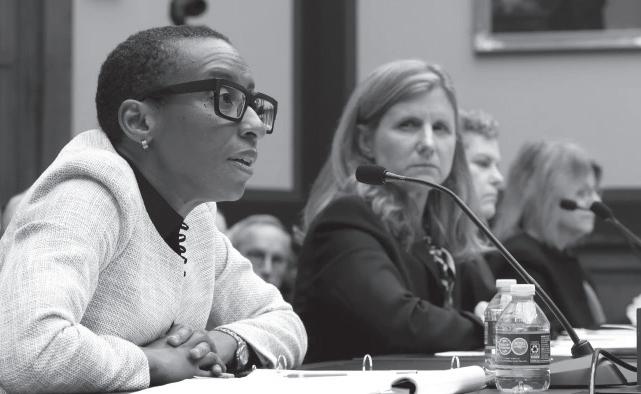
The resulting congressional hearing commenced on Dec. 5, when university presidents Elizabeth Magill of UPenn, Claudine Gay of Harvard and Sally Kornbluth of M.I.T. were called to testify before the House Education and Workforce Committee on Capitol Hill. The women were asked to speak to claims that their schools had failed to protect Jewish students amid the intensifying war and respective rise in antisemitism. The hearing quickly escalated into a convoluted discussion on school policies and procedures, but it would later be suggested that underlying stigmas and irrelevant topics had penetrated the conversation. Republicans have long been known to hold disdain towards
higher education in the United States, claiming that college campuses are mostly characterized by left-wing values and under the influence of the liberal elite, the suppression of conservative ideas. In fact, a 2022 poll at the Pew Research Center revealed that 76 percent of conservative Republicans considered colleges to negatively affect the country.
In the hearing, Republican Rep. Brandon Williams extensively inquired into all three universities’ finances, broaching the subject of endowment tax that has long been popular among conservatives. Utah’s Rep. Burgess Owens raised the topic of Harvard’s minority-specific “affinity celebration” ceremonies, referring to what is for many an empowering and validating experience as a racially divisive and offensive procedure. Determining these subjects as peripheral at best to the discussion at hand, Oregon Congresswoman Suzanne Bonamici was compelled to attempt to steer the conversation back on track.
“I also want to note that the main point of this hearing should be to identify bipartisan solutions to combat antisemitism, not an excuse to attack higher education, liberal arts education, or important diversity, equity and inclusion work that’s happening at colleges and universities across the country,” Bonamici said.
Nearing the end of the hearing, Gay’s career took a detrimental blow when New York’s Republican Representative Elise Stafanik infamously proposed the question: “Calling for the genocide of Jews violates Harvard code of conduct, correct?”
“It depends on the context,” Gay said.
The following day, over 70 members of Congress—the vast majority of whom were Republicans—demanded the presidents’ resignation. A consensus was reached that the three presidents had failed to clearly state that the calls for Jewish genocide constituted harassment and ultimately failed to protect the targeted students.
However, this decision did not gain unanimous favor with the public. Alternatively, it was suggested that Stefanik laid a trap for Gay, coaxing her statement onto the record. Stefanik’s use of the phrase, “genocide of Jews,” was an allusion to earlier in the hearing, when the congregation had discussed free speech in the academic setting. Gay’s hesitance to silence murmuring of the Palestinian term “intifada,” despite its circumstantially violent connotation, was well within reason—in fact, to do so would have been an obstruction of the protesters’ First Amendment rights. Additionally, combating rumors of Gay’s Jew-specific prejudices was her answer to another of Stefanik’s questions, a hypothetical one regarding her course of action in a situation in which protesters called for the murder of African-Americans. Just as Gay began to say, “Our commitment to free speech…” continuing to emphasize the university’s customary proceedings, she was swiftly cut off mid-sentence by her interrogator. Many would later voice suspicions that Stefanik had purposefully pivoted, not having received the answer she’d hoped for. Throughout the hearing and following her incriminating quotation, Gay’s continued attempts to emphasize her personal repulsion to the “abhorrent” speech were met by deaf ears.
Regardless of exterior opinion, Congress had come to a decision. Magill was the first to resign from UPenn on Dec. 9, only four days after the hearing. Her actions were spurred by the withdrawn financial support of prominent Jewish donors, all of whom had called for her resignation along with the congressmen. The withdrawal of donations began with the Palestine Writes Literature Festival in late Sept. 2023, a treasured event among Palestinians for the unique sense of community it offers. The event was initially protested over a month before it took place, when Magill received countless letters from various
Leadership roles open up to non-ASB students
Maggie Marks Staff Writer
donors and the ADL condemning the inclusion of lyricist and accused antisemite Roger Waters in the festivities, among other speakers. At the time, Magill was firm in her defense of the festival, reinforcing UPenn’s commitment to “open expression and academic freedom.” Meanwhile, much of the university’s Palestinian population were saddened by the claims of antisemitism in the context of the festival, claiming that they had only ever intended to preach love and creativity.
The school’s political atmosphere has since pivoted, albeit marginally. Samo graduate DJ Bevan (’23) reflected on the impacts of Magill’s resignation on campus life when proposed with the question of its extent.

“After the hearing, and the subsequent resignation, I’ve noticed more protests regarding free speech and continued Palestinian/Israeli protests. From my perspective, the campus dynamic hasn’t shifted much - but there is more attention concerning academic freedom and freedom of speech,” Bevan said. “Magill’s resignation has led me to feel that some voices are prioritized over others: prominent donors who withdrew grants had a significant influence on her resignation and show signs of rupturing the state of democracy on campus. I believe the school is doing their best to accommodate various perspectives, but external pressures (like donors) are threatening academic freedom. However, I haven’t directly experienced any threats to my educational freedom.”
It was weeks later that Gay resigned as Harvard President on Jan. 2, retiring to a faculty position only six months after first taking office. A significant contributing factor was a rumor that had begun to circulate the day of Magill’s departure: although technically baseless, an accusation was made that Gay had plagiarized some academic work, which only further deteriorated her credibility as president.
The third attendee at the hearing, President Kornbluth, has since refused to succumb to public pressure to resign. This can be attributed in part to M.I.T.’s response to the Dec. hearing, a rapidly-issued statement declaring the administration’s unequivocal support for Kornbluth, who is Jewish.
Gay later apologized for her congressional testimony in an interview with the Harvard Crimson.
“I got caught up in what had become at that point, an extended, combative exchange about policies and procedures,” Gay said. “What I should have had the presence of mind to do in that moment was return to my guiding truth, which is that calls for violence against our Jewish community—threats to our Jewish students—have no place at Harvard, and will never go unchallenged.”
thesamohistudentnewspaper@gmail.com
Some further requirements to run for one of these positions include submitting
Starting in the upcoming ASB elections, eligible students outside of ASB will be able to run for leadership positions. Students eligible to run for Executive President or Vice President must have a minimum of two years of a leadership role in another organization in Samo, such as captain of a sports team or editor of the yearbook, as well as being at least an incoming junior or senior. To run for Class President or Class Vice President, at least one year of leadership is required. In previous years, only students who took ASB would be able to engage in leadership positions.
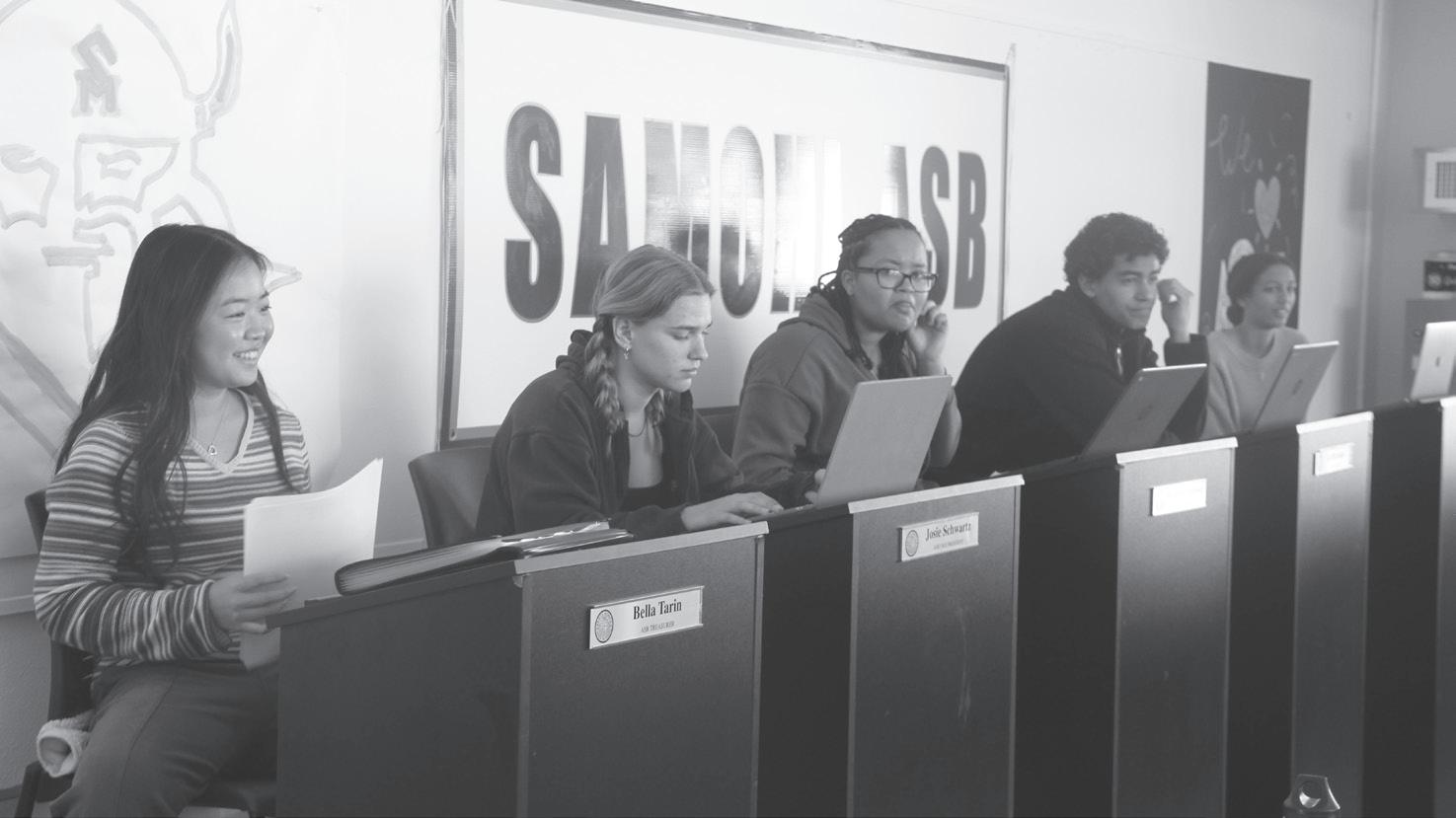
four teacher and advisor recommendations, as well as the pre-established requisites which include having no more than 18 unexcused classes or period absences, maintaining a minimum of an unweighted 2.5 GPA and to not be on academic probation.
Stefani Tovar, the Student Activities Director, talks about how these changes were inspired by the lack of inclusivity in ASB leadership positions. They wanted to address that students often have full schedules, and cannot take on another class.
“The decision to make these changes was driven by a desire for a more inclusive and competitive process that recognizes leadership in various forms,” Tovar said. “The goal is to address the challenge of closed opportunities for students joining a college-bound elective in high school.”
If a student wins their election campaign, they will have to join ASB in the following year to properly take on their new leadership role. Some of these leadership positions that students can partake in include all of the executive positions, such as President, Vice President, Secretary, Treasurer and Student Member of the Board. There are also class cabinets with the same positions.
Tovar explains that the overall goal is to add more community to the school, and

she hopes having a diverse variety of leaders will tie it all together.
“The aim is to gather diverse perspectives to enhance programs and events, fostering a stronger connection among our students and creating a more supportive, inclusive environment on campus.” Tovar said.
thesamohistudentnewspaper@gmail.com
February 14, 2024 The Samohi News 03
Taylor Witt/ The Samohi
The ASB Board, composed of Bella Tarin (’25), Joisie Schwartz (’24), Maryamawet Wondwossen (’24), Griffin Seals (’24) and Mira Wagabaza (’24), discusses construction problems in the Innovation and Discovery Buildings.
Martin Ledford/ Contributor Jayden Montanez (‘24) and Griffin Seals (‘24), the ASB Secretary, deliver their monologues at the 2024 winter pep rally
Harvard students protest in support of Palestinians in Gaza on Oct. 14, 2023.
Presidents Claudine Gay and Elizabeth Magill voice their defenses at the Dec. 5 hearing.
Kevin Dietsch/ Getty Images
Joseph Prezioso/ Getty Images
Battle for votes: Candidates gear up for primary showdown
Liam Sauer Staff Writer
The United States Primary Elections began on Jan. 15 and will end on Sept. 10. The primaries are a system wutilized by the two prominent U.S. political parties, the Republicans and the Democrats, to determine their nominee for the 2024 presidential election, which will take placeww in November. For every primary, candidates are awarded multiple delegates proportional to their percentage of votes. The candidate that meets the necessary number of delegates for their party will gain the nomination.
The front-runners for the 2024 election are President Biden and Former President Donald Trump. Though many political pundits view their match-up as inevitable, others say this may not be the case, as an NBC News Poll found that 70 percent of Americans preferred having neither candidate in office.
Students such as Brody Strauss (‘24) believe this disapproval should be more properly acknowledged by the current political system.
“A lot of people are going to tell you that you have to vote for Trump or Biden. You have to vote for one or the other because of the lesser evil idea. Because if you don’t vote for this guy, this even worse guy is going to come in.” Strauss said. “I think that’s a terrible idea. I think that’s a fear-mongering scare tactic…You’re not exercising your right to have a candidate who doesn’t even reflect your values. You’re exercising your right to say this is who I want to lead.”
The two major candidates participating in the Republican Primary are Trump and former United Nations Ambassador and South Carolina Governor Nikki Haley. Despite the fact that Trump opted out of the recent series of debates, Haley and Trump became the only remaining Republican Candidates after the three initial Republican Primaries.
Trump is running on a campaign of isolationism and populist conservatism. His main points include reinforcing the southern border, pushing for an “America First” foreign policy and applying tax cuts and anti-regulatory initiatives. Many of his supporters believe that he won the 2020 presidential election, despite various inquiries into the election’s credibility that have proved this claim to be false. One of which, a study from the Proceedings of the National Academy of Sciences of the United States of America, found there was no evidence of widespread election fraud.
Nikki Haley, seen by many as a Trump alternative, is running on neoconservatism and as a more moderate alternative to the former president. She advocates for free-market economic policies, for the United States to be
an engaged foreign power and for reinforcing the southern border.
AP Government and US History Teacher Nathaniel Acker (’83) relays some background information on the ongoing Republican Race.
“The one question mark right now are Trump’s legal woes. Is that going to have any impact on the primary?” Acker said. “Will that give Nikki Haley traction as she’s finally starting to be a little more aggressive about her stance on Trump?”
Even as the Democratic Party’s primary elections take place, Biden is the incumbent president, a position that has never lost to a primary challenger during a president’s tenure. However, Minnesota House Representative Dean Phillips and Marianne Williamson are focusing on opening up additional options for the Democratic nominee.
Acker gives some valuable perspective on why many voters on both sides of the aisle are seeking alternatives.
“I think there is a desire to have a younger, more vigorous person on the Democratic side to run as opposed to Biden,” Acker said. “I think on the Republican side, there’s a lot of people who are really worried about Trump…how he really doesn’t care about the guard rails democracy.”
Biden is focusing his campaign on continuing his current presidency, advocating for a form of general liberalism. His core issues are abortion rights, creating an economic safety net, internationalism, and a better social healthcare system. Dean Phillips is working on affordable housing, Medicare for All, anti-corruption initiatives and reforming the bureaucracy of the two-party system. Marianne Williamson is running on climate justice, education reform and anti-corporatism.
Strauss, who will be voting for the first time in the upcoming election, discusses some of his stresses with President Biden’s border policies.
“I’m a registered Democrat. I’m not very satisfied that Biden offered that 5 million undocumented immigrants can come through the border…… I feel like there should be more security. I feel like that’s kind of why it’s, it’s getting easier for for the cartel to sort of bring drugs into this country...It’s a sad, sad thing, where children are being poisoned, where children are taking a whole bunch of drugs, and they’re seizing out before they before they can even have a chance to vote. Despicable. It’s a huge issue”
The independent third-party candidates (not associated with either major party) include activist Robert Kennedy Jr., a philosophy professor Cornel West and Jill Stein, a physician running for the Green Party. Robert Kennedy Jr. is running on environmentalism and disputed anti-vaccination theories. West is running as a more left-leaning alternative to President Biden, garnering support from

voters who have been against the current administration’s Israel-Palestine policy. Stein is running on a traditional Green Party ticket, advocating for climate rights and corporate social responsibility.
The first two Republican Primaries in Iowa and New Hampshire were both majority wins for Trump. Neither of Trump’s challengers in Iowa (Haley and former candidates Governor Ron Desantis and Vivek Ramaswamy) retained any substantial part of the electorate in Iowa. In New Hampshire, Haley followed close behind Former President Trump obtaining 44 percent compared to Former President Trump’s 55 percent. Haley is focusing on the next major primary in her home state, South Carolina, as she remains Trump’s sole challenger to the Republican Nomination.
President Biden won the primary election in South Carolina and a write-in campaign in New Hampshire.
Acker concludes his message with encouragement toward voting students at Samo.
“In terms of the primaries, I would encourage students to find out more about it, register to vote if they’re eligible, and pre-registered in California,” Acker said. “And ultimately, for the election itself, get involved, be engaged.”
thesamohinews@gmail.com
California’s climate crisis and Newsom’s 2024 plan
Addie Burns Staff Writer
For Californians, struggles with the impacts of climate change and pollution have been seemingly constant, and 2024 is expected to be no exception.
2023 was confirmed to be the warmest year in global temperature records dating back to 1850, and climate experts predict that 2024 will top the record of the year prior, according to CNN. In 2024, Los Angeles had already had over 75 percent of its yearly average rainfall, according to the Los Angeles Times. Historically, the state of California has suffered from many storms and floods that significantly impacted underprivileged areas; pollution, wildfires, rising sea levels, and droughts have long-lasting impacts throughout the state. California legislation has taken many steps toward creating a healthier planet, including introducing programs for electric cars, preparing for wildfires, and constructing wind and solar projects.
Many cities in California, including Los Angeles, have high amounts of smog and a shallow air quality index (AQI) according to iqair.com. Since the 2000s, LA’s annual weighted average number of high ozone days has been from 100-150, about 95-145 more days than a passing amount. Although a portion of the shifts occur naturally, most climate change is caused by various human activities, mainly through the emission of greenhouse gasses, which is the leading cause of rising global temperatures. According to Our World In Data, between 1850 and 2021, greenhouse gas emissions have increased from four billion tons to about 54.6 billion tons. The use of cars, planes, and other forms of transportation as well as manufacturing and wildfires contributes largely to this issue.
Since the end of the pandemic, California’s governor, Gavin Newsom, has set aside a large portion of funds in an attempt to combat climate change. This year, Newsom pro-

posed that he will decrease this budget by 7 percent, from $52.3 billion to $48.3 billion. In 2023, this budget was cut by 3 percent to a total of a 10 percent decrease in the past two years. The funding for 2024 will also be spread out over seven years instead of six, as was done in the past. More specifically, this budget cut will reduce investment in programs such as Equitable Building Decarbonization, which focuses on reducing greenhouse gas emissions in homes, as well as Extreme Heat and Community Resilience, which provides funding towards reducing the impacts of higher temperatures locally and regionally. Additionally, over $700 million will be cut regarding water-related investments such as water resilience funding, recycling, and groundwater cleanup. There will also be a three-year delay in transportation improvements like the funding for California’s electric rebate program, Clean Cars 4 All, and the creation of EV charging systems.
Samo’s AP Environmental Science teacher, Ingo Gaida is interested in Newsom’s thought process behind his proposal.
“I’d like to know the motivation why, it’s a bad idea and I don’t know if there’s a reason behind it or not. California is supposed to be the leader in combating climate change, we’re always the innovators,” Gaida said. “I always tell my students the West Coast is the best, we’re the smart people and we get things done so it’s kind of disappointing that he’s going back on that a little bit, I mean seven percent isn’t a huge amount but it’s going to make a difference.”
Team Marine’s club president Maya Williams (’24) knows that the effects of the climate crisis have become severe enough to cause everyday struggles for many California citizens, including herself.
“I think it’s a little discouraging just knowing that we’re in a time where we need to be really focusing on climate efforts,” Williams said. “I think it has a lot of effects, a lot of people suffer from respiratory illnesses, I know I have asthma. I think wildfires also affect everyday activities. Driving, for example, releases a lot of air pollution and can have a lot of health effects on people.”
There are many different opinions surrounding Newsom’s proposal. Despite the 7 percent budget cut on California’s climate budget, substantial funding remains to combat climate change. Nonetheless, it will still slow the process down and reduce investments in various projects and programs.
“It starts with good leaders, making sure that everybody gets out and votes, that we have the right people in charge and then just seeing climate being prioritized and not just seen as an issue that’s separate from everyone else,” Williams said.
thesamohinews@gmail.com
News
February 14, 2024 The Samohi 04
Governor Gavin Newsom speaking with attendees at the 2019 California Democratic Party State Convention at the George R. Moscone Convention Center in San Francisco, California.
Gage Skidmore / Contributor
Audrey Strauss / The Samohi

OPINION
Music: Out with the new in with the old
Liam Sauer Staff Writer
In the nature of society, progression is generally deemed positive. More advanced technologies, medicines and political systems are all signs of improvement. Yet, when newness is equated with progression, this universal fact becomes fiction. This era of new music, though contrary to its name, is regressive. The lyrics, tone, and expression of 60s, 70s, 80s and 90s era music were at an entirely different quality than the music of today. Taylor Swift, Billie Eilish, Drake, Mitski, Morgan Wallen and Tyler the Creator, while not necessarily bad, can’t compare to the talents of Tupac, Beastie Boys, Bob Dylan, Van Morrison, Guns N Roses, Led Zeppelin, NWA, Michael Jackson, The Beatles, Johnny Cash and Metallica. To be brutally honest, the music prior to the 2000s wasn’t just better, it was in a different universal plane.
younger generations prefer old music they never grew up with.


Some would argue that this is a subjective issue. Different people might vibe better to different forms of music. While this would initially be the rational argument, the evidence shows otherwise. The prominent music-analytics firm, Management Control Record Data, found that 70 percent of today’s US music market is made up of old-era music. Obviously the majority has ruled, it’s just better quality. The reasons for this are numerous. Nostalgia obviously plays a part. Music that is more familiar, and subsequently associated with memories, has been shown to be more enjoyable. However this can’t account for the entire reason, as even

In reality, the music process has
 Louis Rotgin Staff Writer
Louis Rotgin Staff Writer





changed. Record labels used to give artists limited resources in order to test the initial success of their albums, and then proceed further. Now, the thought is that to make a song viral, artists should be over-producing their label as soon as they are signed on. Due to this, the style of older-era music was more methodical, testing what worked and what didn’t. Newer generation music often just lacks this depth. Another reason might be the prevalence of autotune. Autotune can be heard in almost every song on the market today. This means that the voices of artists today often just sound less authentic. From a scientific perspective, timbral variety has also gone down over the years. The study, “Measuring the Evolution of Contemporary Western Popular Music”, analyzed half a million songs overtime. The study conclusively found that music has become more homogeneous over the generations. This simply means that newer music is less original and creative.

Many readers of this article will find this take outright offensive and inflammatory. My response? Cognitive dissonance sucks, especially when you’re wrong.
Student news plays a vital role in spreading important information, opinions and ideas throughout the community at Samo. It is seminal to creating an environment where knowledge from within our campus and across the globe is shared, creating room for open dialogue and educated conversations. Not only does student news ensure that attendees of Samo are kept informed, but it allows students to be aware of every aspect of student life on campus.
At Samo, student news encourages critical thinking. By opening doors to concerns that students may have never considered, ideas and issues are spread that can inspire a new way of thinking. Student news can play a beneficial role in creating this environment by paving the way for conversations to be started. In allowing the representation of diverse perspectives across campus, students will be more engaged and educated on ongoing topics. an engaged and educated environment is formed. Therefore, it is extremely important that students voice their opinions, no matter what they may be. Although open dialogue is encouraged, it’s not as simple as it sounds. Students have the right to express their opinions, but oftentimes those with opposing views aren’t as loud. On most controversial issues, the majority of students and staff at Samo land on the same liberal side of the argument. In a community mainly composed of people with similar beliefs, it is natural for students of opposing viewpoints to feel intimidated or shut down when bringing their opinions into conversations. Although understandable, this reaction is completely unhealthy in creating a successful setting.


I’m sure at this point we’re all aware of










the rising popularity of numerous high end brands that have sparked regrettable trends that teenagers absolutely eat up. It’s no question that the ‘opium’ fashion trend is spreading like wild re all over the world. People have adopted the style and are now looking for inspiration in brands like Rick Owens and Balenciaga. However, the major issue with these brands are the people behind it. Drama and controversy is constant in the fashion world, that’s why it’s so entertaining. But the meat of the matter is whether or not these big luxury brands rightfully deserve the positive recognition they receive; or is it time to ditch the Beatle Bozo Tractor boots? Balenciaga has been the center of controversy ever since the previous creative director, Nicolas Ghesquière, resigned and was replaced by Demna. At the Paris Fashion Week Autumn



controversy put aside, selling literal garbage (bags) just should not be allowed. Companies get people to buy into their awful products by making the price points high and keeping the amount produced low.











For example, the Paris sneakers which are just destroyed versions of their knock o Rick Owens Ramones go for $1,850. e denim-sweatpant hybrid pants are quite honestly the ugliest thing I have ever seen, retailing at a whopping $2,000. And last but not least, the trash bag… going for $1,790. For some people, paying that amount is a normal occurrence but for most of America, the lower-middle class, it’s in the ballpark of one month’s rent.












For our generation, everything is fast and most companies can even market those brands have had people knocko s. Usually, bag your Ramones for a fraction of the price,






Winter 2022 show, they got political, referencing the war in Ukraine. Political statements in the fashion industry are quite common, o en the point is to attract buys about doing a Pandabuy haul… think again. for
attention to them whether it be good or bad. And of course the child pornography and ‘bears in bondage bags’ scandal, a double whammy of bad looks for the company. In my opinion, the worst part about Balenciaga is what they actually produce and sell. All

For our generation, everything is fast paced, even the trends go in and out before most companies can even market those popular products. at’s why we have fast fashion, since the dawn of time luxury brands have had people knocko s. Usually, in the heart of DTLA you can buy a YSL bag for less than $100, and these counterfeit products have become even more easy to acquire. With cheap labor, you can get your Ramones for a fraction of the price, drop shipped from China directly to your doorstep. It’s none of my business who buys real and who’s buying the fake, I could really care less. But next time you’re thinking about doing a Pandabuy haul… think again.
 Art by Audrey Strauss
Art by Audrey Strauss
thesamohinews@gmail.com
e power of perspective: Why we need more voices at Samo
Kathleen Faas, a current English teacher at Samo, who previously spent 18 years as the advisor of the The Samohi Journalism program, claims it is difficult for students to open up about these types of topics at Samo.
“I think that when kids do speak, or they do something that singles them out, that they are sort of opening up floodgates for bullying or teasing at least…” Faas said, adding, “It would be nice to have more students who don’t care about the blowback or who are proud to represent an idea, but it’s a rare student who can do that.”
Samo would immensely benefit from students participating in discussions between those of different stances. Debating issues with people of conflicting perspectives allows for both sides to learn the valid points of others while expressing their own attitudes towards the subject. This will create more articulate individuals. The participation of argumentative discourse at Samo provides students with a basis for future success. To a large degree, argumentative discourse can be seen in national political debates that ultimately result in the election of political leaders and the passing of laws. Taken to a smaller degree, the ability to participate in argumentative discourse strengthens self advocacy. As a community, solutions to issues will not be satisfactory to the whole collective as it’s nearly impossible to be aware of the concerns of others without conversing with those of opposing views.
“We need a diversity of opinions, and it needs to be framed,” Faas said. “I never think that all of our perspectives are represented in the newspaper.”
The importance of Samo creating an environment

where students are comfortable in sharing their beliefs can not be understated. The responsibility does not just lie on the school itself, but on each and every student who is a member of the campus community. As stated many times, student news is a great platform to support the sustainability of this environment. The school newspaper is a perfect place for students to express themselves on a large scale, however, only some students are given the opportunity to be a part of The Samo- hi. Any student attending Samo is still capable of sharing their ideas in the paper, via the student contributor program.
is The



february 14, 2024 The Samohi 05
Art by Audrey
Strauss
thesamohinews@gmail.com
Should you separate the art from the artist?

As cancel culture takes hold on the internet, many musicians have been under re for many types of bigotry. Whether an artist has been amed for posting inappropriate content, to racist behaviors, it is not uncommon to see one’s favorite artist on news headlines for questionable behavior. is has raised the age-old question of whether or not someone should separate the art from the artist. Despite music that may be entertaining to listen to, the actions of an artist are o en far too severe to excuse by supporting their music.
Lyrics are poems, which express experiences, ideas or emotions which are normally sung over some kind of beat. Lyrics are written with a single purpose- to cause emotions within the listener. e artist, the one typically writing the lyrics, is creating the art with one sole purpose- to move. Unfortunately, if the artist is under re for
something, it can easily seep into their lyrics. e art becomes tainted by the artist’s ideals, actions or inaction.
A few months ago, a scandal arose for a big artist, Doja Cat. She su ered backlash due to her boyfriend, J. Cyrus, a comedian and Twitch streamer who had been in a few controversies. Old tweets and Vines with seemingly racist undertones were dug up, where he was accused of abusing his Twitch Sta . e accusations were pushed further when he was accused of assaulting various women. Although he apologized and confronted his actions, many claimed his apology wasn’t taking accountability as he pushed that the encounters were consensual. Doja Cat, in response, lashed out towards her fans. In her most recent album, “Scarlet”, she released a song called “Agora Hills”. e song’s main purpose is to appreciate her boyfriend, placing her as the lover and him as the object of her a ection. e art, the “Agora Hills” song, is deeply connected to the artist and her love life. By writing this song about J. Cyrus, Doja Cat promotes him in a sense. Due to the sensual lyrics and loving words, she shows her acceptance of his controversies and horri c past. She isn’t the only artist to write controversial opinions into songs. Although the song may have a catchy beat, it is unethical to play a song that praises a man who has participated in horri c actions. Maddie Braun (’26) talks about her feelings about the Doja Cat drama. “I feel like they should be worried about Doja Cat because she’s in a relationship with a known abuser,” Braun said. Kanye West is yet another artist who was under re for his actions. From wearing a White Lives Matter shirt to countless hateful comments, West has countlessly been viewed as antisemitic. Although he has apologized for his hate, he said he does not regret it. Many people are concerned that he is using his millions of fans to spread hate and misinformation, especially recently as antisemitism grows
as the war in Israel and Palestine continues. Recently, he addressed the antisemitism in a song called “Vultures”. He mentions how he can’t be antisemitic, as he had sexual intercourse with a Jewish woman. is has caused even more outrage as he shows no remorse for his antisemitic words. He refers to the woman as a “Jewish b****”. Kanye West’s art, and his songs, have become ruined by his own antisemitism and hateful actions. By listening to his songs, listeners are supporting him and funding his hateful ideals. It is no secret that artists earn money and fame when their songs are trending. How is it ethical to help fund and expose an artist who has such hateful opinions? When one is considering the actions of an artist, it is seminal to question whether or not they would be supported if they weren’t an artist. In today’s culture, it has been far too accepted to forgive artists for their mistakes because they are musicians who make popular music.
No matter what someone may try and argue, it is nearly impossible to separate the music from the creator. e creator always leaves a part of themselves in the songs, no matter how separate they may seem. It is only natural to not try to separate them then, especially when so many artists show at least some kind of connection to their songs. It is time for artists to understand the consequences of their actions. Consequences that require listeners to protest what they believe in. Braun speaks on supporting certain artists with controversial pasts.
“I feel like if you’re giving the artists money and they’re going to use that money to support their causes that they believe in…” Braun said. “ en I feel like, in a way, you’re supporting those causes, and if those causes are hateful, then you’re supporting those causes indirectly.”
thesamohinews@gmail.com
The accelerated journey of childhood
Max Kehoe Staff Writer
Generation Alpha is the rst generation to have a hand-held smart device for the entirety of their lives. 10-year-olds ooding Sephoras all across the nation are making news because they are purchasing extremely expensive make-up and skincare products designed and marketed towards adults. is led to the “Drunk Elephant 12-year-olds’’ trend on TikTok, where pre-teens purchase unnecessary skincare products. Gen Z creators have shared “horror stories of these preteens, and how they make the shopping experience unpleasant and more stressful for adults.
Gen Z and Gen Alpha have both had access to media at too young of an age. However, what makes Gen Alpha’s situation di erent is the fact that they start posting on social media at a younger age; thus they have an actual presence online, posting in uencer-like content, such as “Get Ready With Me” (GRWM) videos.
e videos that appear on Gen. Alpha’s “For You Page” are people in their 20s getting ready for adult events or activities while promoting make-up and skin care products. is causes Gen Alpha to over consume content made by adult in uencers tailored toward Gen Z teenagers.
Annabel orpe (‘26) shares her perspective that “Children are getting consumed by the media they watch and wearing makeup and skincare products that aren’t bene cial to them. eir skin is too immature to handle this and they are not old enough to use it that regularly.”
Skincare and makeup products are designed and tested for fully developed people to use. Routinely applying products intended for more developed bodies and skin is not only unnecessary, but potentially harmful for a ten-year-old to use.
Especially anti-aging skincare materials such as retinol, which should only be used during teenage years if a person struggles with severe acne and is prescribed it by a doctor. Most pre-teens have extremely clear skin and shouldn’t dabble in anything other than sunscreen and maybe some lip gloss.
extremely clear
Ultimately, it comes down to the parents. Gen Alpha is the product of millennial parents. ey’ve embraced “gentle parenting”, a less strict approach to parenting, to the point where they don’t have clear enough boundaries with their kids. Instead of being able to set boundaries and let their kids know when they’re asking for too much or they’ve crossed a line, they let their kids have, say, and do whatever they want. is is not to say that parenting is easy, generational parenting styles are historically overly harsh and lead to trauma. However, there is a
happy medium to be struck as kids need a backbone in their lives. e current state of parenting has swung too far in the opposite direction, allowing children to fall victim to consumer culture. is new phenomenon will likely lead to unforeseen di culties to Gen Alpha’s development.
Wanting to grow up quicker is a very normal part of being in this grey area of childhood; not quite a teenager but also no longer resonating with young kids. However, skincare and makeup are only one example, the kids of Gen Alpha are losing so many crucial aspects of their childhoods. Constantly being on screens and wanting to look older is fabricating a huge divide in what growing up was not even a decade ago. Rather than ride a bike or swing around on a tire swing in a friend’s backyard, Gen Alpha spends their time contemplating what to post to their Instagram Story and invading adult spaces. Call me old fashioned, but kids need to stop rapidly wasting their childhoods and go play outside!

e digital dawn of news consumption
Claire Harrison Staff Writer
As society descends deeper into the digital age, our youth becomes progressively more media illiterate and desensitized to misinformation. Gen-Z o en mocks older generations for falling victim to false information on platforms like Facebook, yet we are indi erent to this. Teens are immersed in a life that revolves around information they intake on the internet that the line between fact and ction begins to blur.
e presence of social media undoubtedly plays a signi cant role, as quick access to shortened information leads to the false hope that people are becoming well-informed. It’s become overly common to appoint social media in uencers as educators on pressing matters and global crises when in reality these people are unspecialized to speak on major issues. In uencers, who hold signi cant sway over young minds, will prioritize high engagement of their content via likes and comments rather than spreading accurate information. Instead, oversimpli ed narratives circulate on the phones of impressionable minds, meanwhile, credible news sources are constantly sharing objective and factual news that doesn’t catch as much attention to the teen eye.
Gaining media literacy goes beyond identifying blatantly untrue information, but also being able to determine when an online “news” source includes biases. As the 2024 election is upon us and political issues become more widely discussed, utilizing
Art byAudrey Strauss
thesamohinews@gmail.com
themselves to di erentiate the two, especially before broadcasting that information to others. Whether you’re trying to learn about current events or just personal interests, take the extra minute to ensure accuracy. Any reliable source on social media should have an additional presence. News agencies like NPR or Associated Press that have existed for multiple decades in several forms can
try without processing the consequences. Emma orpe (’24) shares how modern information online presents itself and what
this skill is essential. If the majority of our youth is dependent entirely on social media for the latest information on politics and upcoming candidates, voters are le with a small understanding of complex politicians and their policies, ultimately skewing the true intentions of voting. ey are unknowingly making uninformed decisions about the future of themselves and of our country without processing the consequences. Emma orpe (’24) shares how modern information online presents itself and what to keep an eye out for.



or political content, a lot of media can be sensationalized,” orpe said. “It’s meant to draw people


be depended upon.




“Whether people are consuming entertainment or political content, a lot of media can be sensationalized,” orpe said. “It’s meant to draw people in and get their immediate attention to entertain them…It’s important to recognize why a speci c group or person would put out certain content and who’s going to be consuming it. If it’s a very drastic opinion or it seems like it’s meant to rile people up or stir some controversy, that’s dangerous and should de nitely be avoided.”




them…It’s important to recognize why a speci c group or person would put out certain content and who’s going to be consuming it. If it’s a very drastic

Our younger generation must be capable



way of sensibility. Although much dependable information exists on social media, it can get entangled in a web of misinformation. It’s crucial for people to take it upon
Our younger generation must be capable of nding information intelligently, not only in a political context but in a general way of sensibility. Although much dependable information exists on social media, it can get entangled in a web of misinformation. It’s crucial for people to take it upon

“Getting information from social media is inescapable. A lot of credible news channels have adapted to social media and put out a lot of reliable content on social media because they know that’s how to reach a younger generation, but it’s also important to browse the internet and nd news articles beyond that,” or-

“Getting information from social media is inescapable. A lot of a lot of reliable content on social media because they know that’s how to reach a younger generation, but it’s also important to browse the internet and nd news articles beyond that,” orpe said.

thesamohinews@gmail.com
february 13, 2024 The Samohi 06
Art by Max Kehoe
opinion
Koi Lerner Staff Writer
Kanye West’s anti-semitic song, Vultures, has reached nearly 35 million streams on Spotify.
Wikipedia commons/ Cntributor
Student life
Last minute Valentine? Don’t be heartbroken
Oh boy! It’s V-Day already, and you still don’t have a plan. Coming in hot, Valentine’s Day should be memorable for all lovers. While dinner is a simple and safe option, here are some more unique ideas that will be sure to impress your partner. Whether you prefer an athletic climb or a simple night in, there is something here for everyone.










Arts and Cra s at Will Rogers State Park












On the historic ranch of Will Roger, take your loved one to the vast, grassy polo eld for a picnic. Grab a blanket, and make some of your favorite portable snacks. Bring some art supplies like watercolors or colored pencils for when you can’t express yourself through words. If you are feeling adventurous, take a low-intensity hike through one of the park’s scenic re trails. ere is both street parking and hourly parking, so this won’t break the bank.
Indoor Rock Climbing
For more athletic couples, head over to Rockreation and purchase a day pass. e $25 day pass grants you full access to the bouldering facilities, which can make for a very memorable and exciting date. Whether you have experience rock climbing or not, you can test you and your loved ones’ athleticism and trust. Right in the Sawtelle area, work up your appetite and grab dinner at Big Boi o ering Filipino cuisine.

Cozy Night In
For those who want to stay in, collect your pillows and blankets and make a fort and watch a movie. While a seemingly simple task, building a fort can be a fun and engaging activity, and can transport you and your loved one into a di erent world. Watch your favorite rom-com if you’re feeling romantic, and cook up a simple dinner like pasta.

Stargazing at Malibu Creek
Take a drive up the Paci c Coast Highway and into the Malibu mountains at sunset to go see some stars! At Malibu Creek State Park, you can get outside of the Los Angeles smog to a place with limited ambient light and pollution, and explore the night sky. e temperature drops at night, so for optimal comfort, bring some chairs, blankets, and even a warm beverage.
Samo celebrates Black History Month
Kamerin Shakir Staff Writer
Black History Month is a yearly celebration taking place in February that highlights the achievements of African-Americans and the signi cance of the roles played in American history. is year Samo’s very own Black Student Union (BSU) holds many exciting events to commemorate this exciting month. e club aims to pay tribute to the cultural heritage, ascendancy and adversities that have a massive e ect on our country’s history.
BSU members, including Club Vice President Kara Best (‘24), emphasized the importance of celebrating Black History month and what their celebrations stood for.
“It’s important to celebrate Black History Month because Black history is American history,” Best said. “We helped build monuments… hip hop, rock n’ roll and R&B: all are black founded and all hold such an in uence on our world today. And those are small compared to the real sacri ces African-Americans have made to American history.”
Black History Month is a time to honor and celebrate the extraordinary achievements and contributions of Black individuals, whose resilience, courage and determination have shaped and enriched our world. BSU does just that as they are also holding a special culture event on Tuesday, Feb. 13 in the Innovation Quad.
According to BSU Secretary Zoey Alexander (‘24), BSU is also celebrating Black History Month with a spirit week from Feb. 12 to Feb. 16, where each day signi es a di erent achievement made by African-American individuals.
“Spirit week begins with Me Monday which
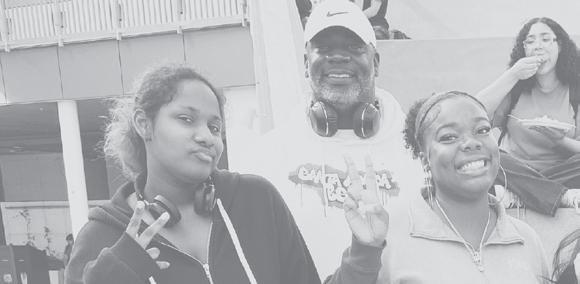

represents being yourself,” Alexander said. “ en Culture Day Tuesday which represents all Black cultures, White Lies Wednesday where people show up with a white t-shirt saying any appropriate lie, rowback ursday which represents throwbacks from all di erent black eras and Blackout Friday which represents Black pride.”
Traditional celebrations for Black History Month began in 1915, half a century a er the irteenth Amendment abolished slavery in the United States. Carter G. Woodson, the founder of the Association for the Study of African American Life and History is known as the creator of Black History Month. Previously known as “Negro History Week,” by the late 1960s thanks to the part the Civil Rights movement and a growing awareness of Black identity, “Negro History Week” had evolved into Black History Month on many college campuses and eventually the country as a whole. e dedication and hard work of Woodson and many other Civil Rights activists toward the cause led us to a yearly, month-long celebration which is held every February.
As we re ect on the signi cance of Black History Month, let us continue to recognize, appreciate and amplify the voices, stories and legacies of Black individuals who have paved the way for a more inclusive and equitable future. Do your part in the celebration by showing up and showing out during spirit week and the other events held to celebrate this exciting month.
thesamohinews@gmail.com


From left to right: BSU members Marley Cortez (’24), Zoe Alexander (’24), Aliyah Williams (’24) and Reign Snowden (’24) sell Valentines’ Day Grams during lunch in the Innovation Quad, assisted by one of the BSU advisors. Lewis Alexander.





Winter Pep Rally lights it up
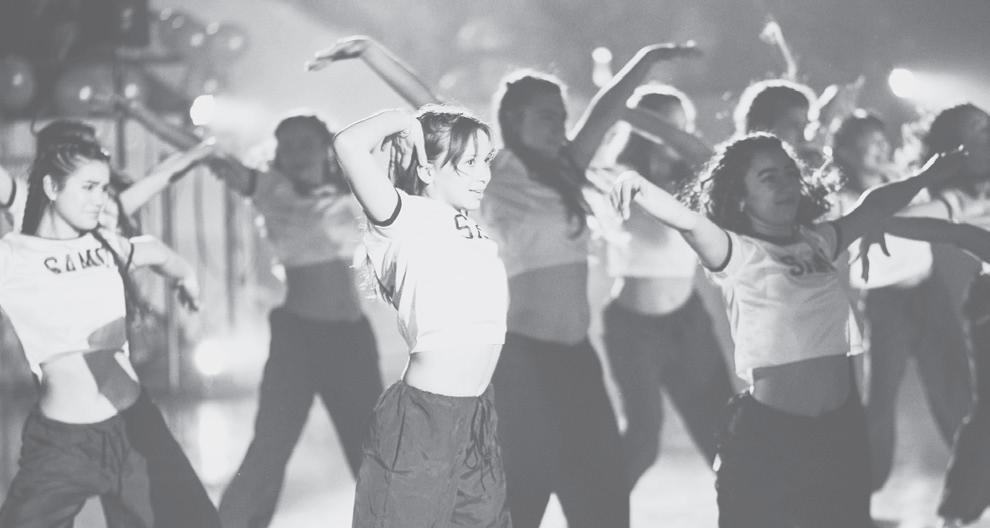
On Friday, January 26, Samo’s ASB kicked off the first pep rally of the semester in the North Gym, hosted by seniors Griffin Seals (’24) and Jayden Montanez (’24). Efforts from the rally hosts, performers and sports teams all contributed to creating a memorable experience for all attendees, exemplifying the spirit of high school in one of its most quintessential recurring events.
The Jan. pep rally was separated into two different events: one for upperclassmen attendees and one for the lower grades. ASB chose a “rave” theme, electing to turn off the gym lights and instead use spotlights, colorful lasers and audience-held neon glowsticks to illuminate the space. This, along with the lively, immersive music, contributed to the feeling that students were attending a high-energy concert or dancing at a club.
“It was pretty fun, I was a little nervous going into it,” Montanez said. “But I went out there and just sort of had fun with it, had a great time, and hopefully I’ll get a chance to do it again in the future.”
As per tradition, the winter pep rally began with the national anthem performed by Samo’s esteemed Chamber Choir. Afterward, Montanez introduced Samo’s Pep Squad, where the Samo Golden Poms performed a routine to songs by Kanye, Nicki Minaj, Shakira and Drake followed by a performance by
The Samo Golden Poms perform their routine during the upperclassmen showing of the Jan. 26 pep rally. Pom performed their energetic display for not just one, but two separate rallies.
Samo Cheer featuring songs by Ken Carson, Nicki Minaj, Drake and Ice Spice. Then, the winter varsity sports teams performed short skits to encourage student attendance at their home games.
Basketball player Anton Berge Wells (’24) performed a dunk on the North Gym basketball hoop during the Boys’ Varsity Basketball introduction. Varsity Basketball Coach James Hecht, who is also a math teacher at Samo, was recognized during the rally for reaching a milestone of five hundred career wins as a high school basketball coach.
“I appreciate Coach Hecht’s passion for the game and his conviction to teach players both the fundamentals of basketball as well as higher level play,” Varsity Basketball Player Holden Hendrickson (’24) said.
To emphasize the sense of community among rallygoers, students became competitive while playing “Finish the Lyrics,” which was won by the seniors and by the sophomores at their respective rallies. The festivities ended with a performance by the Madrigal Choir of the Samo Hymn of Praise, during which many Samo students traditionally threw peace signs (or “V” for “Vikings”) signs to show school spirit. The Samo community looks forward to further fun, immersive displays of school spirit.
February 14, 2023 The Samohi 7
Kamerin Shakir / The Samohi
Art by Audrey Strauss
Nathan Vasquez Staff Writer
thesamohinews@gmail.com
Manny Lopez / The Samohi
Maggie Marks Staff Writer
California.com / Contributor
Run Wild My Child / Contributor
Only In Your State /
Adobe Stock / Contributor Contributor












Bannedbooks nd
Declan Ney Staff Writer


For the past few years, the issue of banned books has been a hotly debated topic across America, especially in terms of policies in education. From toddlers to teens, state governments have grown concerned about the information put into young minds through literature. While kids in California aren’t directly a ected by these recent measures, other schools have felt the burden of these bans, most signi cantly in states like Texas and Florida.
In defense of the classics:
For most high schoolers, reading a chore. Mandated by English classes, students feel little to no inclination to read for pleasure, but read purely for the grade. On top homework and extracurriculars, it is challenging to nd time to crack open a personal novel and truly enjoy it.While o en overlooked in today’s younger generations, there are classic books while they might take a little longer to delve show exceeding importance in today’s society. Here, you will nd four novels that do indeed up to the praise they receive.

OliviaStephansen:eHateUGiveAngie omas
In March of 2023, the Martin County School District in Florida pulled 80 books from its schools because of the state’s opinion on the de nition of romance novels and content involving race and sex, according to a report by the Treasure Coast Palm. e books were written by the likes of James Patterson, Toni Morrison and Jodi Picoult, who have all had a profound impact on the world of teenage literature and high school English classes.
Samo librar-
ahome at Samo
ian Dana Bart-Bell is extremely worried about this anti-book propaganda sweeping the nation and the long-term e ect it will have on the country’s youth.
“ e rise of parent advocacy groups with a strong ideological in uence on what’s taught in schools and put in libraries is very concerning,” Bart-Bell said. “ is new trend has done a lot of damage over a short time, both in terms of removing materials and removing access to materials.”
Delaney O’Dea (’24) is one of many AP Literature students at Samo reading Morrisson’s Beloved: a book about slavery in the Civil War that is banned in states like Florida and Kentucky.
“My AP Literature teacher loves Toni Morrison and always talks about the importance of painful portrayals of historical experiences,” O’Dea (’24) said. “I thought Beloved was super well-written and exposed the class to a time and experience that we otherwise would not be exposed to.”



As a more classical rendition on true crime, In Cold Blood by Truman Capote follows the murder of the Clutter family in the small town of Holcomb, Kansas. With no apparent motive, Capote recreates the murder of the family and investigation and trial follows. In Cold Blood highlights the nature American violence and the American dream, connecting deeper re ections
In November of 2023, Texas’ education board rejected the inclusion of climate-crisis policy solutions in the textbooks of students, according to a report by the Daily Guardian. While this is an incredibly ba ing maneuver due to the current state of the environment, the irony behind it isn’t hard to nd as the state’s production of oils and natural gas is larger than any other state in America.
“Fear and the perception of being able to control what your child learns in the classroom are mostly to blame for this ridiculous trend,” Bart-Bell said. “You can show them the values you have as an individual but in icting them on other people is disturbing at that level.”
Fortunately for Samo’s student body, the Samo library has become a safe haven for books that are banned in other states. A yellow cart at the library’s entrance o ers students a catalog of books that have already been banned by other states. Among the most notable titles are Harry Potter and the Sorcerer’s Stone by J.K. Rowling, e Call of the Wild by Jack London, I Am Not Your Perfect Mexican Daughter by Erika Sanchez and is Book Is Gay by Juno Dawson.
A few thousand miles west in Texas, the situation became even more dire. A 2020 comparison study by the New York Times found that the information put in McGraw Hill textbooks in Texas is alarmingly di erent from textbooks in the state of California that were created by the same publisher. Whereas the California textbooks contain valuable information on the Harlem Renaissance, the Texas textbooks say the era is dismissed by critics because of “the quality of literature produced”.
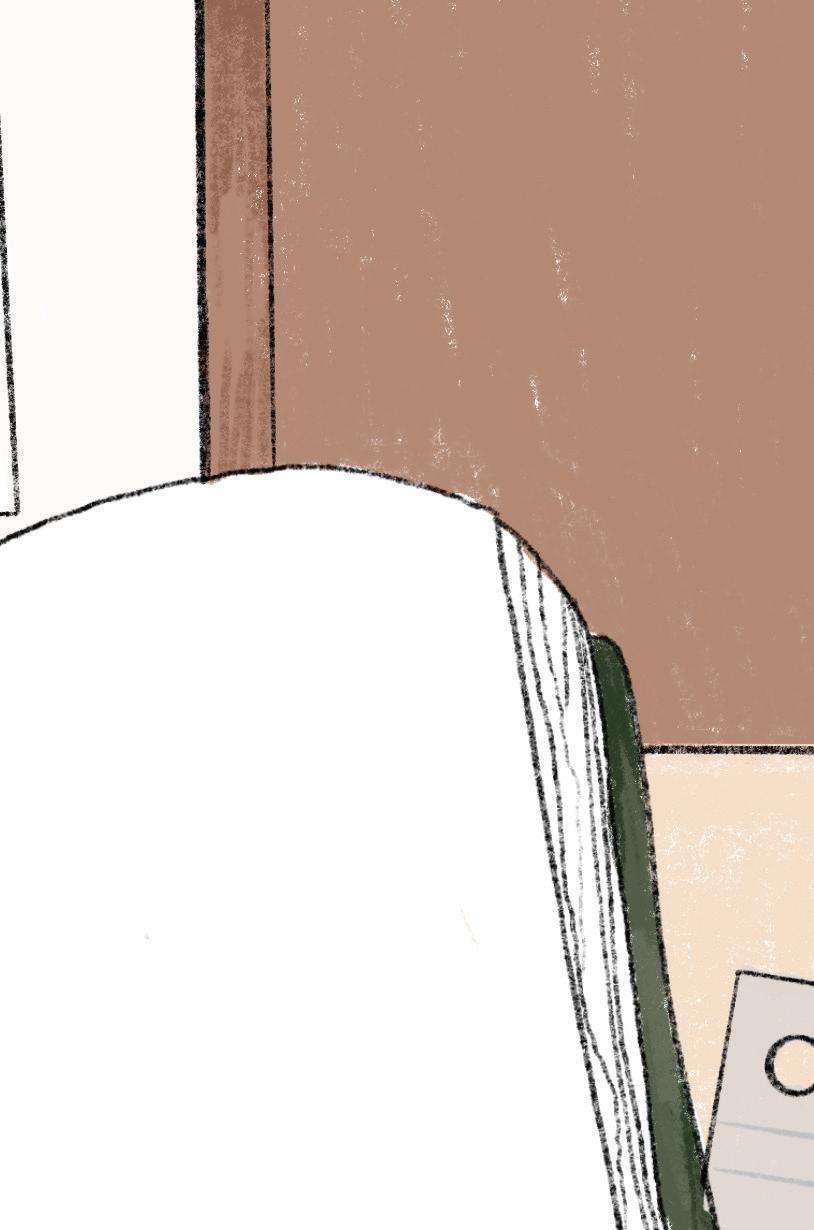
“ ere are some books here that people in di erent states wouldn’t like because of how they expose children to things like drugs, sex, and other parental authorities that are not strong,” Bart-Bell said. “I think having a diverse collection of books that are appropriate for Samo students and their needs and supporting things such as the curriculum and student interest are things I can do.”






Mr.Blanck: Two On Two Out-RyanBlanck
SamoEnglishteachers’toppicks!
Mr. Khoeler: RighteousMind-HughHowey



Sienna Bevan:aePerksofbeing Wall owerStephenChbosky


Ms.Stapleton: eHeaven&EarthGroceryStore-James McBride Rodriguez: DemonCopperhead-BarbaraKingsolver
Ms.Benon: Wool-HughHowey
Mr.Fulcher: Daytripper-FábioMoonandGabrielBá
Ms.DeLaCruz: Patron Saints of Nothing-RandyRibay









KoiLerner:DeadSoulsNikolaiGogol






AiliForster:EarthlingsSayakaMurata

Asnation, and likecombs infatuated your responsibilities - e In“I’mthetheytheleave daresto tions school,thatHolden throughthe catingparents -Metamorphosising“Icannot Justinsideme.” asthe beetle,upon yourage,are worldbetterthan youreadabout himself,theeasier betterwhenit’s
 Maggie Marks Staff Writer
Ryan Kim: eOutsiderS.E. Hinton
Maggie Marks Staff Writer
Ryan Kim: eOutsiderS.E. Hinton
reading is classes, for top of challenging and today’s that, into, society. indeed live crime, the town apparent the and the trial that Blood nature of violence American connecting ections
about society. Capote thrillingly captures the experience of a convict and how this disastrous event rippled through the town of Holcomb. As a commentary on Stalinist Russia, Animal Farm by George Orwell is set on a farm of overworked and mistreated animals. e novel follows the rebellion of the farm animals searching for equality and freedom. is book represents the events leading up to the Russian Revolution, as Orwell, a democratic socialist, was a critic of Stalin. A satirical piece: Animal Farm has a wider application in society that still should be valued in today’s world. We can see the contrast of power between characters such as Napoleon, the main antagonist and Snowball, the pig who challenges Napoleon. Animal Farm is written in a straightforward fashion, as not to confuse the reader with the complication of politics.
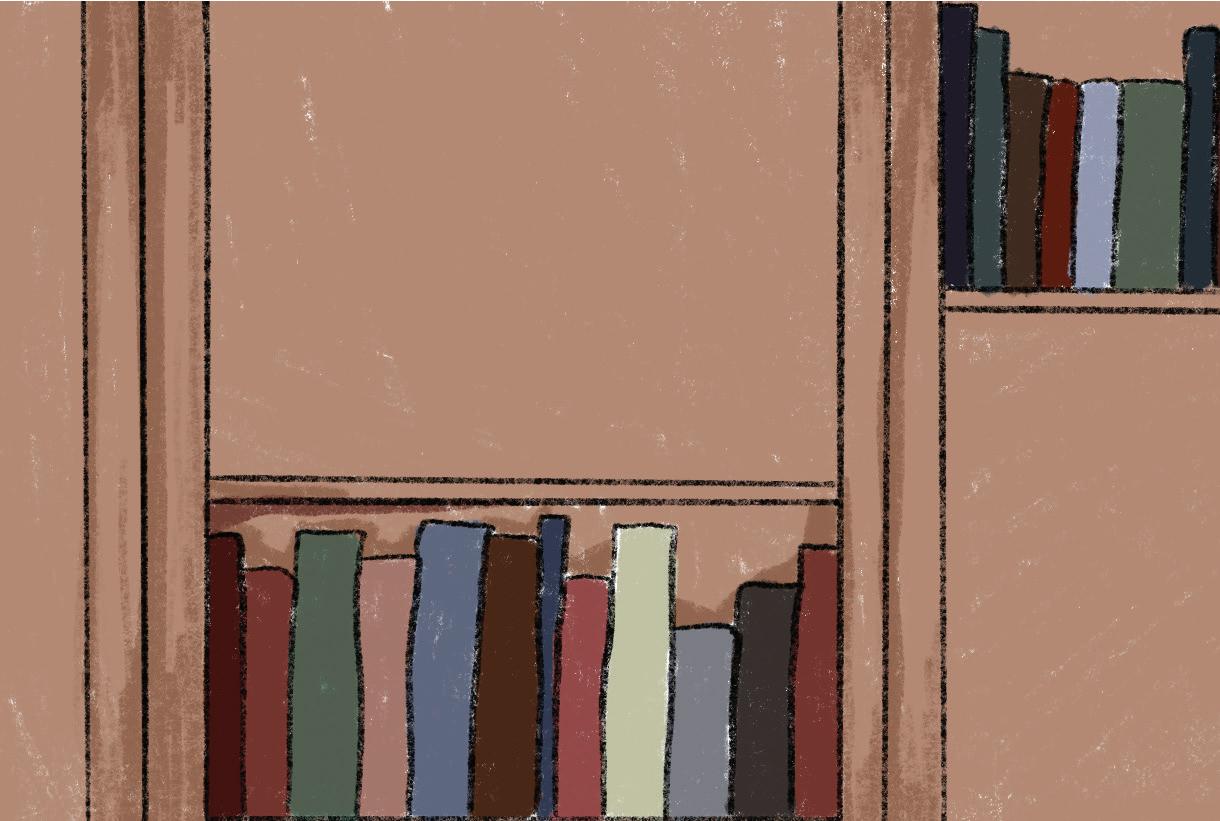






Fahrenheit 451 by Ray Bradbury follows the dystopian society, in which books are outlawed. Following the viewpoint of anarchist and reman Guy Montag, he slowly becomes one of the nal preservers of literature, a dangerous position for any citizen. Living a bland and futuristic life, the novel starts with Guy Montag meeting his eccentric neighbor, teaching him to question the world more critically. While ctional, Fahrenheit 451 opens readers’ eyes to looking at the foundations of society with judgment and allows readers to reconsider who has control of civilization at large.
While o en read in seventh or eighth grade, e Outsiders by S.E. Hinton deserves a re-reading. Depicting the story of a harrowing two-weeks of a
14 year old boy and the division between the youth in Oklahoma: the socs and the greasers. A er a brawl, ending with a greaser killing a soc, we see the turmoil between both groups unfolding. e Outsiders can be one of the few classic novels that students tend to resonate with on a deeper level, as it has common themes depicting struggles with social status and growing up.









 Dalia Puchalt Staff Writer
Dalia Puchalt Staff Writer














Reading burnout: Inevitable?
Cleo Topp Sports Editor
foundefollowingbooksarenotfortheeasilycorruptible.Ifyou’veever yourselftoeingthelinebetweenbearableandcompletelyintolerable,thisisalistofnovelsyoushouldavoidatallcosts.Withjustafewpages,youmay andndyourselfmoldingintoapersonyoudon’trecognize.Evenyourdearestfriends familycan,andwill,leaveyou.Treadlightly,foryouwillbecomeinsu erable. -AmericanPsychobyBrettEastonEllis “Iliketodissectgirls.DidyouknowI’mutterlyinsane?” Bateman.Uponopeningthisbook,youwillbeintroducedtotheprotagonist,Patrick Ifyouareextremelysusceptibletoyourinnatedesires,especiallyifyour aninnatedesiresinvolvethemurderingofeveryonearoundyou,Batemanwillbecome unfortunatestandard.Hisskin,hisbody,his ance—they’reperfect,andthey’re tempting.Beverycarefulthatyourmaskofsanitydoesnotbegintoslip,because truthbetold,nobodyreallywantstoknowthesideofyouthatrelatestoaserialkiller.
Fromwell-readto,well,insu erable

-MyYearofRestandRelaxationbyOtessaMoshfegh “Sleepwasmydrug,myescapefromthemonotonyofeverydaylife.” isnovelfollowsanunnamedprotagonistassheembarksonayear-longhibernation,suppliedwithvariousprescriptionsbyacomicallyincompetentpsychiatrist. Asareader,youcanonlyattempttofollowhertrainofthoughtasherlifecomesin andoutoffocusentirelyunchronologically.Stumblingthroughadruggedhaze,she combsthroughherpastandattemptstoseparatehermiseryfromhernarcissism.Just you,sheiswoefullymisunderstood,muchtooprivileged,muchtoobeautifuland infatuatedwithsomebodywhodoesnotcareabouther.Moshfeghspinsatalefrom deepestcuriosity:whatwoulditbeliketo your responsibilitiesanddoabsolutelynothing? eCatcherintheRyebyJ.D.Salinger themostterri cliaryoueversawinyourlife.” the10thgrade,manySamostudents ndthemselvesfundamentallychangedas leavetheirEnglishclassroomsfortheday.Salinger’santiheroHoldenCaul eld todowhatmanyateenageboywishtheycould:liveutterlyfreeoftherestricthataccompanybeingaminor.Followinghisexpulsionfromasu ocating prep Holdendarestoindulgeintheprivilegesofadulthoodatage16,andhesees thefacadethatisauthority.Unlikeyou,Holdenhasnohomework,nosu oparentsandnoresponsibility.Youreallydon’tlikedoinganything,doyou?




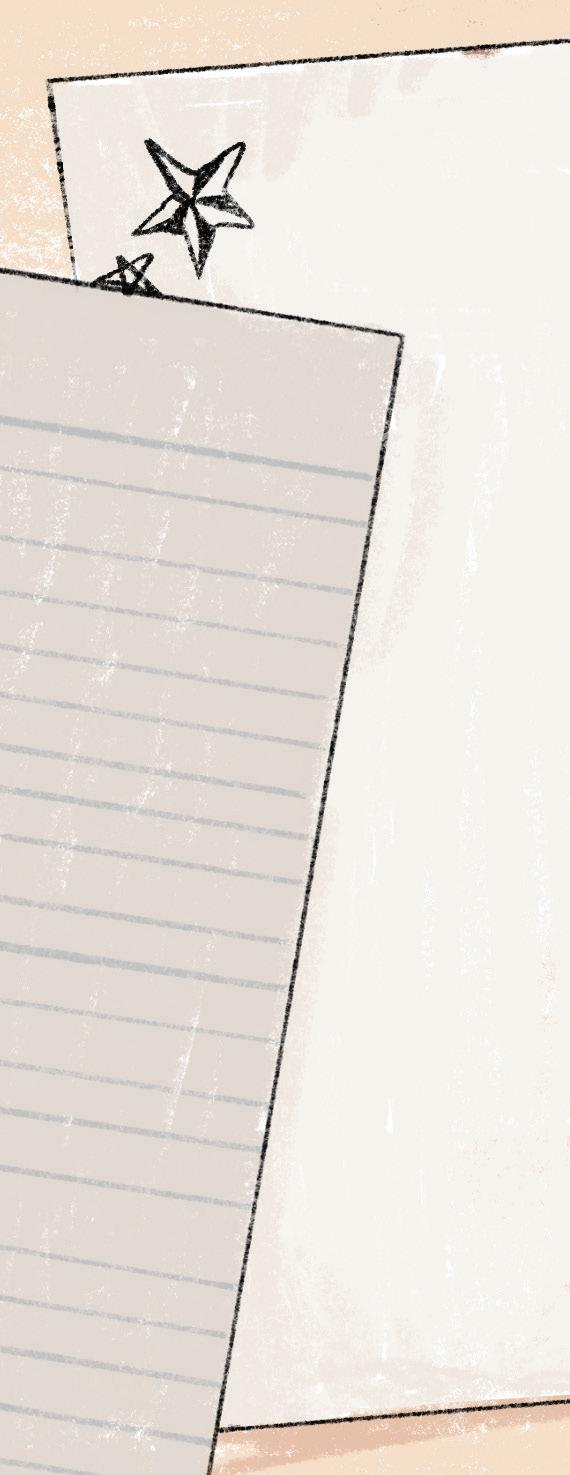
















-MetamorphosisbyFranzKa a cannotmakeyouunderstand.Icannotmakeanyoneunderstandwhatishappenme.” protagonistofMetamorphosisfoundhimselfturningintoamassive uponindulginginKa a’swork,you,andmanyotherpretentiousboysaround arelikelytodiscoveranewfoundpassionforthinkingyouunderstandthe thaneveryonearoundyou.Ka a is brilliant and tortured; the more abouttheprotagonist’scrushinglonelinessandthedisgusthefeelstowards easieritbecomestobecomfortableintheworstsidesofyourself.Whyget it’ssocomplexandbeautifultobemiserable?










On January rst, many of us decide on our new goals: to start a new workout routine, get more sleep or nally become disciplined readers. But let’s be honest, almost two months in, most of us have given up these goals; who has time to read anyway? Maybe we chose reading as a goal to keep ourselves intellectually stimulated, or simply for joy. Either way, a er promising to become a “reader” again, by a month in we nd ourselves burnt out and unsuccessful in our attempts. Setting the goal to become a reader inherently places standards on the hobby. A reader seems to be someone who has read a plethora of books and goes to bed only a er nishing at least 50 pages. e person who has analyzed all the classics, but still has time to indulge in easy, lighthearted books. is person seems knowledgeable and worldly, and we all strive to be them when we decide to read again.Putting this pressure onto the act of reading almost forces it to become a task. Instead of reading for fun, we are reading only for the sake of being a “reader”. Although we desire to be diligent readers, we are o stopped from doing so because of our busy lives. Most weeks are spent enduring an entire day of classes and homework, only to get into bed near midnight. As much as we want to read, going to bed right away or opening up tik tok to scroll for an hour is much easier, and more gratifying in the moment.













work, of and yourself a reprieve, and we Putting a are are en an bed midnight. tok for as a Instead a more becoming If chapteryourpoint. Emphasize of worldend no count-

For most of us, reading burnout is natural and somewhat inevitable. And while it might seem hopeless, it is possible to start reading again as a passion. Instead of treating it as a goal or a task, focusing on reading more casually can take the pressure o of becoming a model reader. If reading a chapter every night seems impossible, start with a page and allow yourself to stop at any point. Emphasize the joy of reading and escape from a world where everything must be for a greater purpose. At the end of the day, no one is counting the number of books you read, and what matters most is the joy of entering a di erent reality. Let yourself use reading as a reprieve, and li the stress o of yourself. Simply read.



AddieBurns:GuideAGoodGirl’s -toMurderHollyJackson Hawene Alemayehu:EducatedTaraWestover






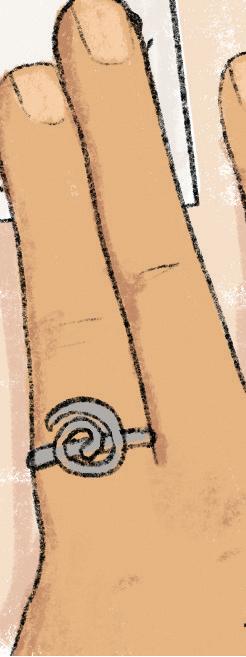

classics:
OPINION: e “right” way to heal
Sara Javerbaum Arts & Entertainment Editor
Zolo . Lexapro. Prozac. You’ve seen these names in medicine cabinets, heard them in conversation and may even take them yourself. As years go by, selective serotonin reuptake inhibitors (SSRIs) have become more normalized, and an increasing number of teenagers are taking them. Simultaneously, many teenagers seem to dread starting an antidepressant, whether for fear of numbness, dependency, loss of identity or other major personality changes. Regardless of these concerns, mental illness is an epidemic and must be treated. As di erent combinations of treatments are seen streaming throughout society, more and more questions arise. Which is more e ective? Can someone manage severe depression with simple holistic treatments?
Since the rollout of the rst antidepressant in the 1950s, millions of people around the world have been prescribed medication to combat mental illness. According to e O ce of Population A airs’ most recent study, 13 percent of American adults took antidepressants between 2015 and 2018. Moreso, as of 2021, an estimated 49.5 percent of adolescents have experienced a mental health disorder at some point in their lives, with 32 percent of 13-18-year-olds experiencing an anxiety disorder and 13 percent experiencing some sort of depressive disorder. ese numbers continue to increase, leaving millions of teens torn between the best path for treatment.

fundamentally changes people’s personalities. One root of this fear is the perception that mental illness doesn’t shape one’s identity but rather de nes it entirely. School psychologist Madison Braverman understands that mental illness does shape character and identity, but urges students to understand that they are more than their illness.
“You are not your disability,” Braverman said. “You don’t have to lose [your identity] by healing, and while mental health struggles are absolutely a part of you, it’s all about focusing on your strengths and your superpowers.’
While starting a prescription medication can be intimidating, it’s hard to ignore just how life-saving they can be. District-wide mental health coordinator Shuli Lotan clears up falsehoods around medicine.

Mental healthcare is complicated in nature. Individuals grappling with mental illness o en associate both the positive and negative aspects of their condition with core elements of their identity. e fear of leaving behind parts of one’s personality perpetuates the narrative that medication

“Typically, when medication is going to help you, it’s because there’s some sort of imbalance in your chemistry, in your body,” Lotan said. “So, taking medicine isn’t going to turn you into a fully di erent person. Really, it’s going to turn you into the person you want to be.”
person you

In a country in which Western medicine is o en seen as the “right” approach to illness–be it physical, emotional, etc–Americans o en overlook alternative ways to healing. While Western medicine uses a drug or treatment to correct one illness, a more holistic approach considers the individual’s entire well-being, including their mental, emotional and physical state. It emphasizes natural, plant-based remedies, such as meditation, herb supplements and aromatherapy, among
Margaret’s Place, a safe haven for students
Sia Kresch Staff Writer

invites any student who needs support to stop by E117.
Mental health is our emotional, social and mental wellbeing. Having good mental health is extremely important especially in school, as it can affect how we feel, think, act and even handle stress. To help students manage the stress of school throughout the day are the Margaret’s Place workers at Samo.
Margaret’s Place is a safe space for students located in Samo’s English building in room E117. Their mission is to help end the cycle of violence in our schools and relationships within the community. This program is a part of the Joe Torre Safe at Home Foundation and is spread across multiple locations including Los Angeles County and New York City. Being a therapist at Margaret’s Place means working with students in many different ways.
Margaret’s Place Therapist Lara DeSanto provides free therapy to students who have been exposed to violence, trauma or unhealthy relationships. DeSanto also hosts events such as open lunch, where students can participate in stress relieving activities or workshops about unhealthy relationships and how to deal with them. Margaret’s Place also has a peer leadership club for students who want to get involved with spreading awareness about these topics.
Being able to work at Margaret’s Place means that DeSanto gets to associate with different students and hear their stories, specifically the students that are a part of the peer leadership club, which she especially enjoys connecting with.
“I enjoy watching them really become activists and spread the message that we are trying to spread,” DeSanto said.
Peer leadership students focus on spreading the overall main message of Margaret’s Place— that the cycle of violence in our communities needs to end— but they also spread the core values of the foundation. These core values are a fundamental part of Margaret’s Place. They include the fact that violence is never okay and that you’re not alone if you’ve experienced violence or unhealthy relationships. They also believe that you should speak up when you’re ready and that what has happened to you is never your fault. DeSanto’s favorite part about being a therapist is being able to help these students, as she believes it is extremely important during this time in their life.
“I wanted to become a therapist so I could help people cope with their mental health,” DeSanto said. “I especially like working with teenagers since I believe that being an adolescent is such an important part of your life, and I wanted to be a support during that time.”
thesamohinews@gmail.com
 Art by Audrey Strauss
Art by Audrey Strauss
others, instead of synthetic drugs. While more research needs to be done on the e cacy of holistic medicine, centuries of practice support its value. Apart from more traditional practices, more contemporary and widely accepted forms of treatment like talk therapy and mindfulness are wildly helpful in addressing mental health concerns. In one classic study published by the American Psychology Association, a study revealed that 75 percent of patients in talk therapy improved a er six months of treatment. is study, among many others like it, reveals just how helpful non-medicinal treatments can be for mental health concerns.
“It’s such a shame that so many people reduce these practices that can have a massive impact on our mental health to ‘woo-woo’ or ‘too out-there,’” Lotan said. “Maybe you want to do art therapy or try a somatic approach, which is a really interesting way to treat trauma. Maybe it’s meds, maybe it’s herbal remedies, maybe it’s acupuncture. ere’s a sort of patience you have to have in exploring what works for you.”
At the end of the day, there’s no “right” way to treat mental illness. Chemically, culturally and emotionally, each person faces a di erent struggle with their mental health. No matter the speci cs of one’s struggle, being able to utilize outside support is a crucial step to healing. For those who don’t have the resources to do so, Samo o ers mental health services within the school.
“Every day, we have drop-in counseling in Admin 513, and there’s a therapist waiting for kids to pop by,” Lotan said. “You can try sitting with someone and talking by yourself, and then they can refer you to more ongoing regular counseling if that would bene t you. We also have counseling groups starting up and we are always open to students’ questions or concerns about mental healthcare on campus.”
thesamohinews@gmail.com
Why should you see the Spring Musical?
Emi Yamashiro-Hergert Student Life Editor
Tickets are on sale now for the Samo eatre program’s showing of the timeless classic, “Phantom of the Opera,” on Feb. 24-26 and March 1-3. Members of the cast, tech team and pit orchestra weigh in on this exciting event.

“Last year we won a Jerry Herman award for our performance in the Drowsy Chaperone... We de nitely kicked it up a notch for Phantom and it’s intense. e end product is going to be fun and really interactive.”
– Norah Allshouse (’24) (Pit Flutist)
“ is is one of the bigger shows that we’ve done in a long time. It’s di cult for both the actors and the pit, and it’s one of the most elaborate sets... A lot of people don’t get to do this musical, so might as well come see it. And it’s really good!”
– Brooke Aron (’24) (Actress for Christine)


“We’ve put a lot of work into this musical and it’s by far the most intense set. We’ve been working hours on it, I’m here until 11 every night. It’s going to be the most insane production that this school has ever had.” – Joseph Farzam (’24) (Tech - Sound & Lights)
Margaret’s Place educates about and offers resources to those affected by the cycle of violence. Therapist Lara DeSanto
Sia Kresch / The Samohi
February 14, 2023 The Samohi 10 Student Life
more
Samohi Theatre / Contributor
Nika Nazarizadeh / The Samohi
Nika Nazarizadeh / The Samohi
thesamohinews@gmail.com
Claire Harrison Staff Writer
In a world of constantly changing songwriting, concept albums remain one of the most immersive forms of music-making. Story-telling albums go beyond a simple compilation of tracks but create a string of songs that all contribute to one cohesive narrative. Each song can mimic a different chapter in a book, creating a genuine and immersive storyline for listeners. Concept albums contain a level of intricacy that isn’t as apparent in modern music, specifically in its lyricism. It’s become overly common for artists to create straightforward and uncomplicated lyrics so they can place their spot on charts, but the depth of well-crafted, thought-out lyrics is an irreplaceable experience. Artists of story-telling albums frequently incorporate more sophisticated writing techniques, using poetic devices like allusions and euphemisms to create a more impactful experience. Music with this level of detail and sequence isn’t something to be played as background noise, it requires a higher extent of attention and thought.
Beyonce’s Lemonade marks one of the most well-renowned concept albums as she unfolds the emotional complexities of marital issues and infidelity. Beyonce breaks her story into several stages, mirroring the emotional stages of her life as she navigates the challenges of confronting an unfaithful husband. Listeners wit ness the feelings of denial and resentment eventually develop into acceptance as they achieve reconciliation within their relationship. Tracks like “Pray You Can Catch Me” encapsulate the pure fury built inside of her all the way to one of the album’s final tracks “All Night” which yearns to rediscover their once love and rebuild their marriage. What makes Lemonade truly an exceptional experience is its authenticity and relatability. Beyonce expresses a side of vulnerability and raw, undeniable emotions that resonates with countless amount of people who face relationship challenges. She is able to take a compelling storyline of love and loss and intertwine it in a world of sound and music-making.
Preacher’s Daughter by Hayden Anhedonia (known professionally as Ethel Cain) takes an equally impassioned approach through a fictional story of Ethel in a small town whirled up in a life of religious and romantic trauma. Follow ing the loss of her preacher father and of her ex-partner who left town, Ethel encounters a new lover, Logan, in the fourth track, “Western Nights”. She is desperately in love with him despite his many flaws, until his tragic death in a police shootout. The midpoint of the album indicates a new path for Ethel, one in which she runs away from her hometown and develops an affection for a new man, Isaiah. The two begin a life in California, consumed by sex work and drug dependency, much of which can be attributed to Isaiah. Just as Ethel realizes her lifestyle contradicts the religious values she was brought up on, her lifestyle catches up to her. Some of the last tracks on the album narrate the downfall of Ethel’s demise. “Don’t think about it too hard/Mama, just know that I love you /And I’ll see you when you get here” In the album’s final lyrics, Ethel looks over her mother in the afterlife and implores her not to dwell on her death, as she’ll be waiting for her in heaven. Cain goes beyond expectations of conceptual albums by diving into a world of fiction, fantasy and complex characters. Cain forms in tricate storylines and relationships between each song, creating an emotional dy namic between the listener and Ethel as we her face struggles, and finally sympathize with her death. Cain creates a multi-dimensional world within her words, with every line making listeners more involved in her restless lifestyle to the point that people feel for her emotions alongside her as if she’s become their favorite character in a new TV show. favorite concept artists a heartfelt chocolate box and love letters as a token of my appreciation.
Art By Sara Javerbaum

Romantic Films
LIVE MUSIC FOR LOVERS




Romantic Books
Loveless - Alice Oseman
Never let

Love Songs
“Runner” - Alex G
“Thirteen” - Big Star
“Fell in love at 22” - Starflyer 59
“Onie” - Electric Prunes
“Beachwood Park” - The Zombies
“Somebody already broke my heart” - Sade
“Mama, you’ve been on my mind” - Jeff Buckley
“More than a love song” - Black Pumas
Andrew in Drag” - Magnetic Fields
“My life in art” - Mojave 3
“I’m the man who loves you” - Wilco
February 14, 2024 The Samohi 11
Max Kehoe Staff Writer
Make this Valentine’s Day memorable by surprising your crush with tickets to see their favorite performer live. Check out this calendar for an overview of upcoming concerts in the SoCal area!
This
Murakami Me Before You Serendipity
Past Lives
Cheerleader Moonrise Kingdom
Summers Tale
Summer Love
other drugs
walk to remember
The Man Crazy, Stupid, Love Why Him How to lose a guy in 10 days Love, Actually
Rouge The
Valentine’s Day
me go - Kazuo Ishiguro Salt to the Sea - Ruta Sepetys A very large expanse of sea - Tahereh Mafi
is how you lose the time war - Amal El-Mohtar + Max Gladstone Normal People - Salley Rooney 1Q84 - Haruki
Amelie
But I’m A
A
500 Days of
and
A
She’s
Moulin
Samohi Staff Presents:
Favorites!

Rising stars take the stage at Cafe Samo
On January 26 and 27, the Samo choir program hosted its annual Cafe Samo show, leaving an adoring crowd in awe of the students’ talent. Each act was carefully picked through an audition process led by Brooke Aron (’24), Justin Xu (’24), Walden Sullivan (’25), Sam Rubin (’25), Madeline Bryce (’24), Hope Hamilton (’24), Sarah Linowes (’24) and Valentina Manco (’24), and ultimately 21 acts were selected to play both nights. Upon being chosen for the show, students had just 10 days to prepare for the final culmination of their hard work.
The concert is student-coordinated, and directed by two leaders, who were Aron and Hamilton in this year’s concert.
Aron reflects on the considerations when choosing the soloists and per formances, especially as auditions were open to all choir levels, but only 20 spots were available.
“We wanted the show to be jam packed with fun songs that featured all grade levels and many students per num ber. It was difficult because there were so many good audi tions!” Aron said.
Saturday and Sunday opened with student-led acapella groups Beatyshop and T-Tones, and Valkyries and Barbershop, respec tively. Following these performances, Azeliya Woldemariam (’24) gave a powerful rendition of “Forget You” by CeeLo Green. Woldemariam’s confidence on stage and striking voice was the
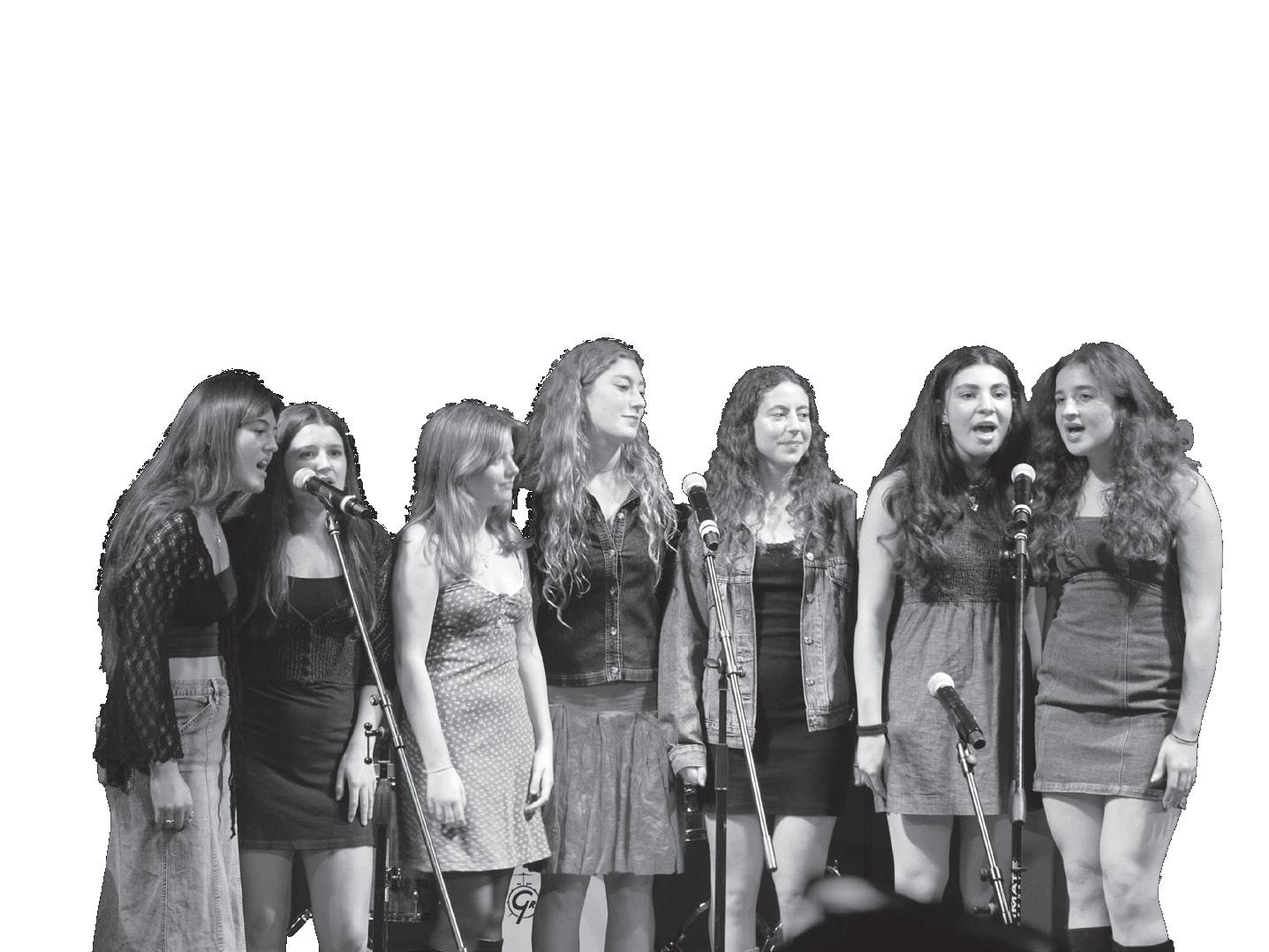
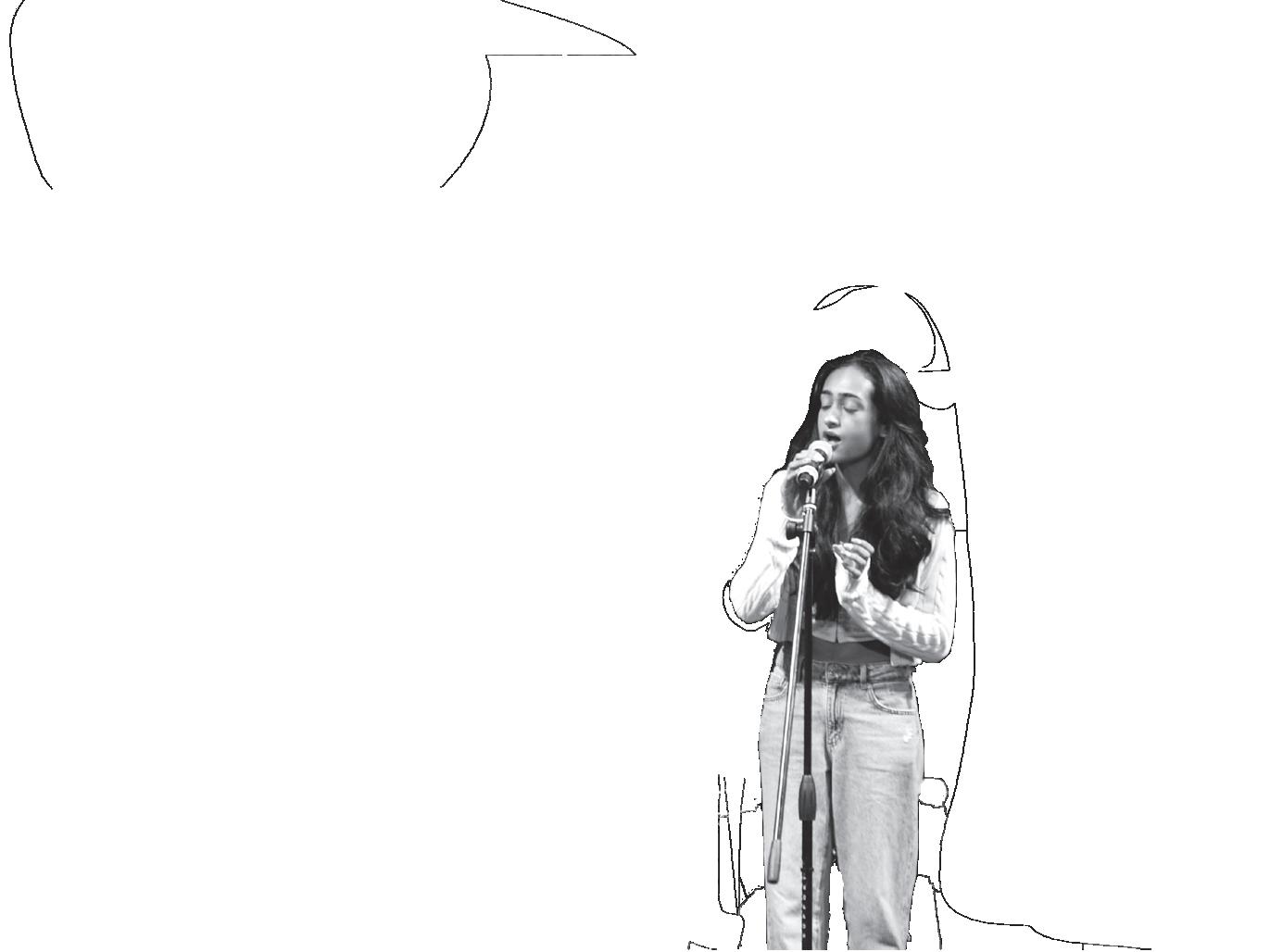
Cafe Samo serves not only as a display of Samo’s best musicians, but also a learning experience for the students dedicating weeks of their time in preparation for the event. From the lighting, to the sound and stage structure, the final show quality was a true feat.
“I was proud of how it was executed and how quickly it was pulled off. As for the tech side of things, the Farzams helped so much with sound, lights, and stage management,” Aron said.
The sound of music: Samo’s recent band concerts
On January 23, Samo’s band department started the new year on a high with Concert Band, Symphonic Band and Symphonic Winds showcasing their growth over the previous semester. Closing off an incredible show, Marching Band showed off their silver-medal-winning performance, leaving the crowd of doting parents stunned.
The Concert and Symphonic Bands kicked off the show with “Metrix” by Robert Sheldon and “Amparito Roca” by Jaime Texidor, both of which were directed by Terry Sakow. Later, the percussion section performed two surprise pieces before the Symphonic Winds performance.
After a small tuning session, the Symphonic Winds dived into their press-themed pieces, “The Mission Theme” (From NBC News) and “Washington Post”. The Symphonic Winds also per formed a piece “Someone to Watch Over Me” that included a performance by vocal soloist Lily Hynding (’26), a flutist in the Symphonic Winds.
“It was certainly an experience and as fun as it was, it was also nerve-wracking and there was a lot of work involved”, Hynding says. “But in the end, we made it sound pretty good”
Concluding Samo’s Winter Band Concert, the marching band played What Dreams May Come, with soloists Isabella Gonzalez (’24) and Ethan Clark (’24). Bidding the crowd adieu, the march ing band played off a brilliant night with the traditional pep song “Vikings Bold”.
The Samo Jazz Band started the semester swinging with their winter concert on Jan 21. Their first concert of the new year fea tured prominent influences in the jazz world Stanley Clarke and Clay Jenkins, as well as Samo’s very own John Beasley (’77).
Jazz 2, led by director Ryan Rowles, kicked off the night with a Gordon Goodwin piece entitled “Act Your Age”. The band played one more piece together before splitting into their Tuesday and Thursday combos for a song each. The combos are composed of students who attend an additional session a week to rehearse and prepare extra music for the concert. The full group then got back on stage and played two final songs to close out their night. Jazz 1, directed by VAPA coordinator Tom Whaley began with “Walk in the Park” by Sammy Nestico. Four-time Gram

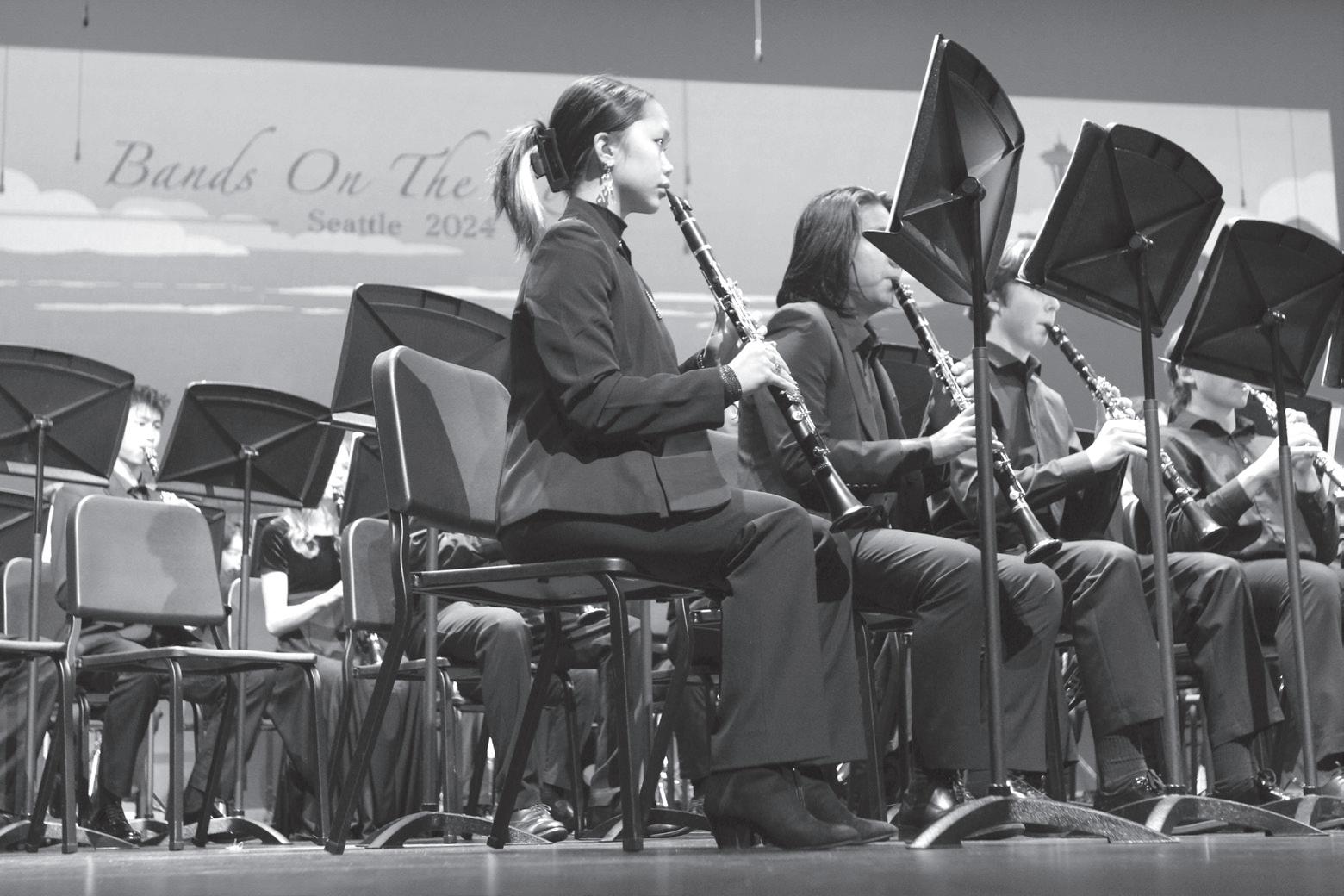
kins (’26), a member of the Wind Symphony, speaks on the work they put into the concert.
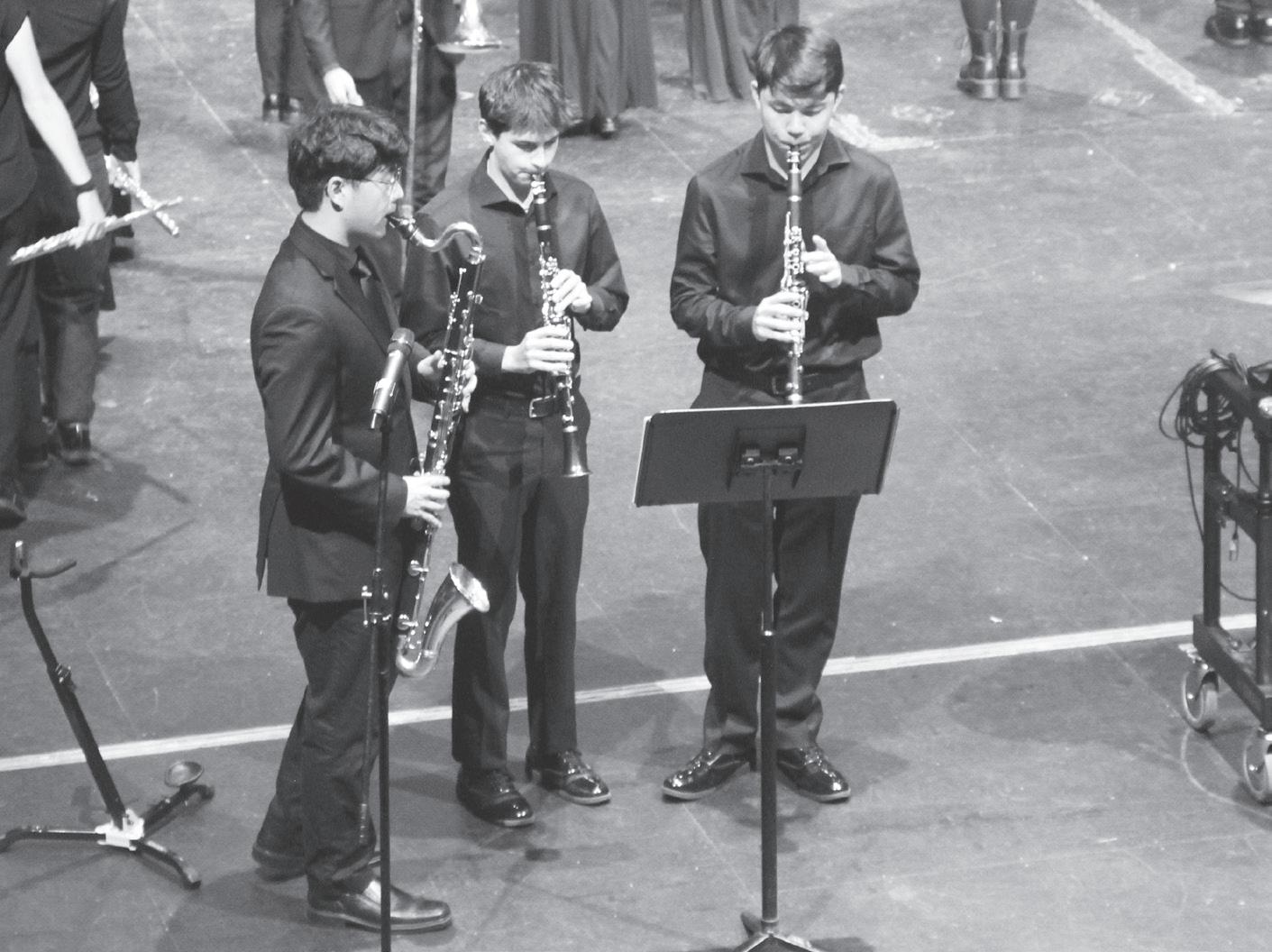
ley Clarke, Grammy award-winning pianist John Beasley, and renowned jazz trumpeter Clay Jenkins guest played with the ensemble. After two more pieces, all-state jazz band trombonist Ethan Clarke (’24) led a combo that played another Goodwin piece before performing “3 Wrong Notes”, composed by Stanley Clarke himself. The band finished off the night with “Silly Putty”, another Stanley Clarke piece, and “Spain” by Chick Corea. Jazz 1 saxophonist Sean Limpisvasti (’27) enjoyed himself alongside his bandmates. “I think the concert was a great success. Playing with a great like Stanley Clarke was the best…Next time, I hope the concert sells out,” Limpisvati said.
“We’ve been working on it for probably a few months,” Jenkins said. “We’ve known about it since the beginning of the year, but both bands have mostly [practiced] a few months, like three I think.”
The standout music was the songs from ‘West Side Story’, which both bands played. Wind Symphony played ‘West Side Story’ while Wind Ensemble played four dances from the musical- ‘Scherzo’, ‘Mambo’, ‘Cha-cha’ and ‘Cool (Fugue). The songs were recognizable, a staple in the repertoire. The two bands surpassed the high expectations born from the familiarity, playing each note with such care. Jenkins articulates on how expectations are set for the top two bands and her feelings on the concert itself.
“I mean, it’s the top two bands. I think there’s definitely expectations that they’re gonna be really good and I think it’s going to be great…” Jenkins said. “...It’s gonna be held at a pretty high standard. Mr. McKeown holds us at a pretty high standard.”
thesamohistudentnewspaper@gmail.com
Samo’s cafeteria transforms for Spaghetti and Strings
On the night of Feb. 10, the Intermezzo, Philharmonic and Symphony Orchestras greeted guests at Samo’s cafeteria for the annual Spaghetti and Strings concert. Before making their way to their seats, guests bid on various items — anything from an Ubatuba Acai gift card to a massage — at the concert’s silent auction fundraiser.
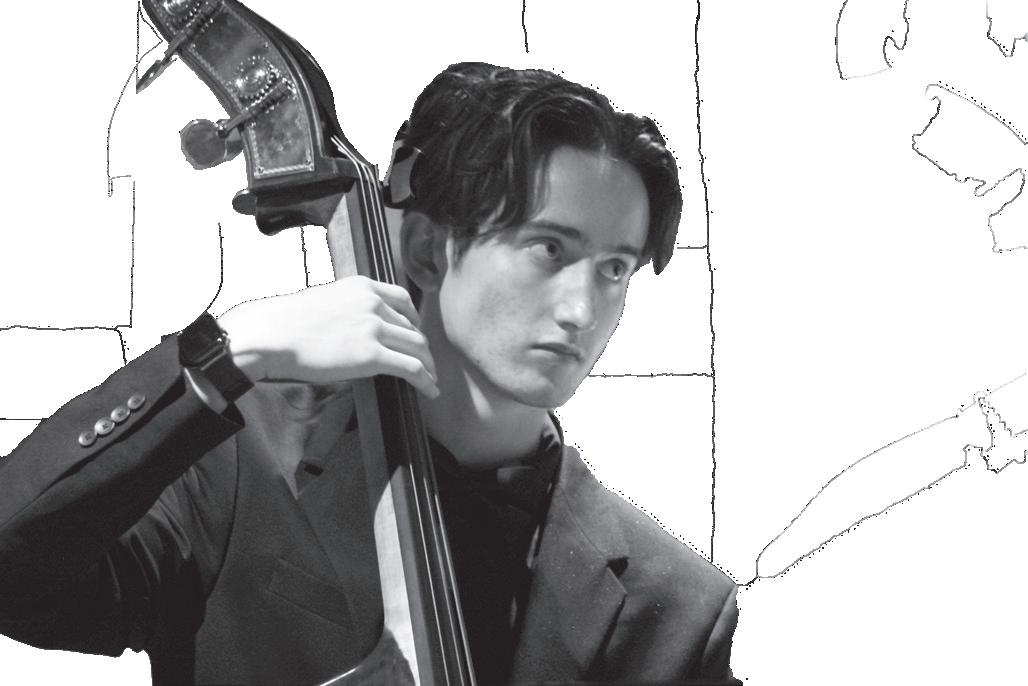
A few took the elevator to the Discovery Rooftop for the Sunset
Sips event, where adults could enjoy alcoholic drinks with the beautiful beach skyline. Throughout the night, the or chestra students took shifts working as servers and bussers, handing out bite-sized appetizers while the Chamber Or chestra serenaded guests.
In previous years, the program held Spaghetti and Strings at the Loew’s Santa Monica Beach Hotel. However, due to the hotel currently being under construction, Instructors Jason Aiello and Jim Wang decided to put on the event at Samo. Aiello compares this year’s concert venue to the Loew’s.
“Being able to use this nice area as well as the Discov ery rooftop lends to a really nice atmosphere,” Aiello said “Also, from what I’ve heard, the food we’re ca tering is better than the one served at the hotel.”

Shayl Khatod (’26), a violinist for the Symphony and Chamber Orchestra Orchestras, agrees.
“I like the concert this year better, and having it at school
and using that space was really nice,” Khatod said. There aren’t many options for parents to be on campus, so it was a great option for us to all get together there.”
As everyone sat down to enjoy their three-course meal of salad, pasta and tiramisu, the orchestras began their concert. In between pieces, guests were also able to bid at a live auction. Khatod recalls his favorite part of the night.
“I really enjoyed performing in the orchestra, especially the Hebrides Overture by Mendelssohn, it’s a great piece!” Khatod said.
Nathan Vasquez Staff Writer
Louis Rotgin Staff Writer
All photos by Aili Forster / The Samohi thesamohistudentnewspaper@gmail.com
Louis Rotgin / The Samohi
Nathan Vasquez / The Samohi
Tom Whaley directs and performs with Jazz 1. Clarinetists Connor Mckeown (’24) and Dylan Fanselow (’24) perform solos alongside Bass Clarinetist Joshua Tang (’24).
Koi Lerner Staff Writer
Koi Lerner / The Samohi Sadie Pearlman (‘25), a member of the Wind Symphony, watches McKeown conduct as the band plays “West Side Story”.
Matilde Martinez-Navarrete Sports Editor
thesamohistudentnewspaper@gmail.com All photos by
/ The Samohi
Matilde Martinez-Navarrete
Sports
Is progress being made in women’s sports?
 Addie Burns Staff Writer
Addie Burns Staff Writer
For years, women have been portrayed as lesser athletes than men. ey are considered weaker, more vulnerable, more emotional and are o en sexualized in the media. It has been proven that women continue to be overshadowed by men in terms of fame, popularity, money, television contracts, and more. According to a study by USC and Purdue University, 95 percent of all TV sports coverage within the US was on men’s sports, whereas only 5 percent was allocated to women. Despite female athletic achievements in the sports world, they still have to overcome the presence of their male counterparts.
Women’s basketball player, Caitlin Clark from the University of Iowa, is considered the best women’s college basketball player. According to ESPN, she is the rst player in NCAA

Bronny James, a men’s basketball player at the University of Southern California. Although Bronny is not in the top 100 best men’s college basketball players, he as a freshman gets better NIL deals than the senior Caitlin Clark.
Another example of this is the US Women’s National Soccer Team (USWNT) versus the US Men’s National Soccer Team (USMNT). Over the years, the USWNT has been more successful than the USMNT, yet they get much less money and recognition than the men do.
e USWNT has won the World Cup four times, whereas the USMNT has never won a single World Cup. According to ESPN, the men earn 2.5 million dollars just for qualifying for the World Cup while the women only earn $750,000 for doing that same thing. Compared to men, women’s players don’t get nearly as much exposure when they’re not playing on the national team. Male players are able to get larger TV contracts and fame through Major League Soccer, the Premier League and other professional soccer leagues. Samo’s Varsity Girls’ Soccer Captain Josie Schwartz (’24) shares her opinions on this issue.
“As a girl who has played soccer her entire life, I have felt and noticed the lack of appreciation that women in sports receive,” Schwartz said. “ e USWNT is a great example as they are constantly overlooked, even though they are more successful than the men’s team.”
 Manny Lopez Staff Writer
Manny Lopez Staff Writer
Women have been ghting for equality in sports throughout history. ey were once not even permitted to watch the Olympic Games. In today’s sports world, men and women can play professionally with “equal” limitations, giving both genders the resources they need to thrive in athletics. Now more than ever, female athletes provide a stable platform that brings positivity towards women.
Caitlin Clark, one of the most popular women’s basketball players, is bringing worldwide attention. She is projected to be the unanimous number one overall pick in the upcoming WNBA dra , and NBA analysts project that she’ll break long-standing scoring records. She is also bringing media attention towards women’s sports like no other college female athlete ever before, showing a societal trend towards giving more positive attention to female athletes.

lines how her success has a ected those who watch, participate and claim the sport as their own. As she enters retirement, S. William’s legacy will undoubtedly continue to inspire young athletes to pursue their dreams and work towards achieving their goals.
Equal pay has always been an issue in women’s sports, but this concern was addressed in 2007 when Wimbledon rst announced that the women’s prize pool would be equally matched with that of the men. A er the policy change, V. Williams shocked the world at the 2007 US Open in a huge upset victory. She was awarded $1.4 million for her fourth Wimbledon victory, the same amount as the men’s champion, Roger Federer. Since then, other athletes and sports federations have taken notice and have made similar strides towards equal pay. Samo Girls’ Flag Football Team Captain, Isabella Sanchez (’24) shares her thoughts about the future of women’s sports.



One history to have 900 points and 300 assists in a single season; every National Player of the Year award also went to Clark. She has gained lots of traction for her achievements, but the amount of positive attention from sports media she receives is still extremely unusual, especially for a women’s basketball player. Despite her popularity, this still doesn’t give her the same bene ts that male athletes receive. is can be seen through

e achievements of women in the sports world are continuously overshadowed by the achievements of their male counterparts. Male athletes will get much more recognition for doing the same or even less than female athletes. ere is much controversy among women in sports, but it can be seen that in general, they receive way less attention.


Other female warriors that have brought worldwide attention to themselves and their sport are Serena and Venus Williams. S. Williams, also known as the Queen of Tennis, forever embedded herself in the game’s history. Her legacy was not only de ned by her game, as she dominated the sport for years, but also in the viewers that she attracted. At the US Open, a look at the number of black fans and people of color present under-


Martial arts from the female perspective
Aili Forster Centerspread Editor
Within sports, conversations around sexism are usually limited to pay, physical ability and overall resources and popularity. However, with close-contact sports such as martial arts, sexism becomes much more complex and nuanced. e dynamics between trainees and the overall ultra-masculine culture within such sports create toxic and unwelcoming environments, particularly for women.
Macho culture surrounding sports viewers and players themselves has always existed and been criticized in the past for being unhealthy. But for martial arts speci cally, strength, violence and ghting have been ingrained into the sports themselves, which only generates more toxic masculinity.
When starting judo at age ve, I was excited to be in a space where I felt empowered and respected by my peers – both girls and boys. Regardless of gender, they judged me purely for my skills and attitude. As the sport became more competitive, weight and gender did naturally come into play. Despite this, judo continued to be an environment where I was virtually shielded from the gender norms so embedded into daily life otherwise. It was only once I became a teenager that the gap between the majority-male judokas I trained with and I, one of the few women and only teenage girl at my dojo, became apparent. It wasn’t so much the “classic sexism” where people directly undermined my abilities or made sexist comments, rather it was a shi in energy and the way I was perceived.
Prior to this, I was so young that I felt my fellow trainees were almost unaware of my gender, and I was content as they treated me equally to my brother and his friends. It made me feel powerful. Now, I felt how uncomfortable the older men became when faced with me. I was avoided during open sparring, and on the occasion that a man approached me, he was either über-aggressive so as to prove something or gave up completely, as if I was not even worth the e ort. Going against the extremely combative type would usually get me injured, and the indi erent type would provide futile training. I would leave practice feeling dispirited and dread the next practice knowing I would overcompensate in my performance to feel any acknowledgement. But why did I suddenly seek so much attention from men who were less skilled than me and who didn’t even respect me?
While my account might be due to the lack of teenagers at my dojo, the overall dismissal of my skills directly reects the way macho culture has shaped martial arts and the dojo environment. It is di cult to ignore gender in a sport in which weight, muscle and physical ability a ect performance greatly. Most gender divides are thus only based on objective evaluations used to make fair competition. Despite this, this divide carries into the dojo atmosphere and proves itself to be a problematic matter, despite its more subtle nuances. Sharing stories and opening up uncomfortable conversations beyond obvious sexism will certainly make women feel heard in their struggles, and ultimately make martial arts more welcoming.
“I think our school supports both girls and boys’ sports to relatively the same degree, however there’s much more of an emotional invest- ment and emphasis on male sports,” Sanchez said. “I hope that women’s sports continue to grow and that viewers learn to appreciate the differences rather than constantly comparing female and male sports.”


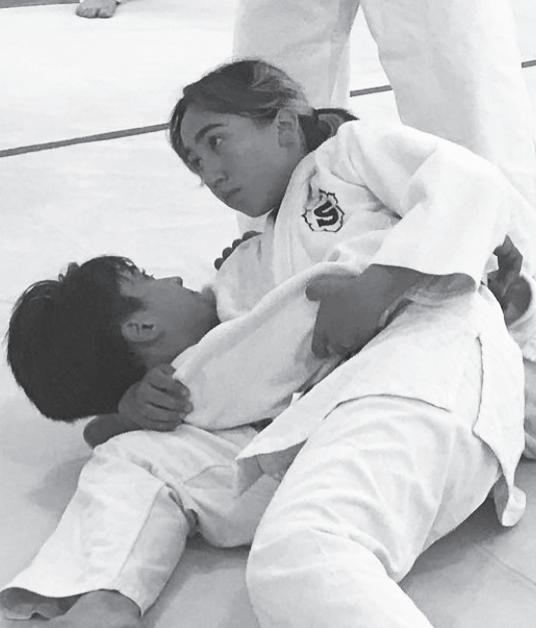
February 14, 2024 The Samohi 13
thesamohistudentnewspaper@gmail.com
Aili Forster (’25) pins her brother Erkki Forster (’22) during Newaza practice at her home dojo, Sawtelle Judo Dojo, in 2019. A. Forster continues to practice judo, and is now an Ikkyu Brown belt, on her way to becoming a Shodan Black belt.
Aili Forster / The Samohi
thesamohistudentnewspaper@gmail.
Art by Cleo Topp
YES NO
Art by Audrey Strauss
Boys’ basketball success leads them to round one of playo s























loss

High School in the first round of the CIF Playoffs. They were placed in the CIF-Southern Section Division IIAA thanks to their key 50-45 Bay Mira Costa. The playoff game started out with Samo down 17-34 at the half, and resulted in a their efforts. The Vi-
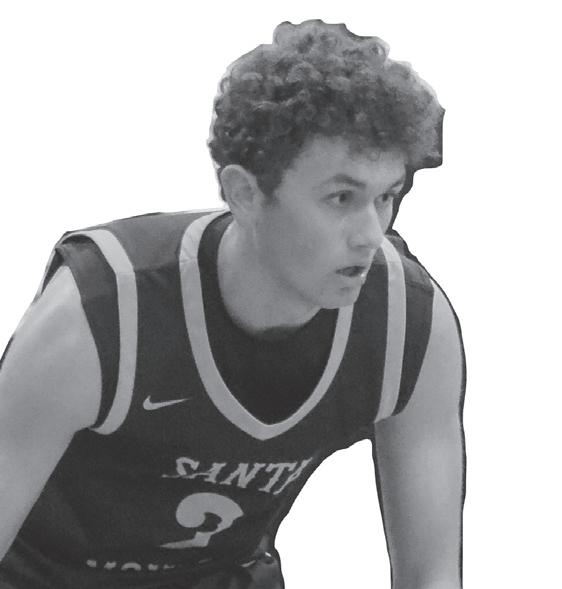
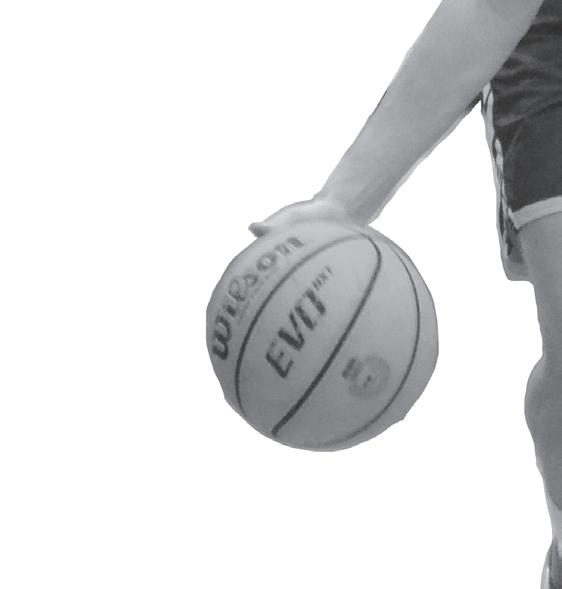
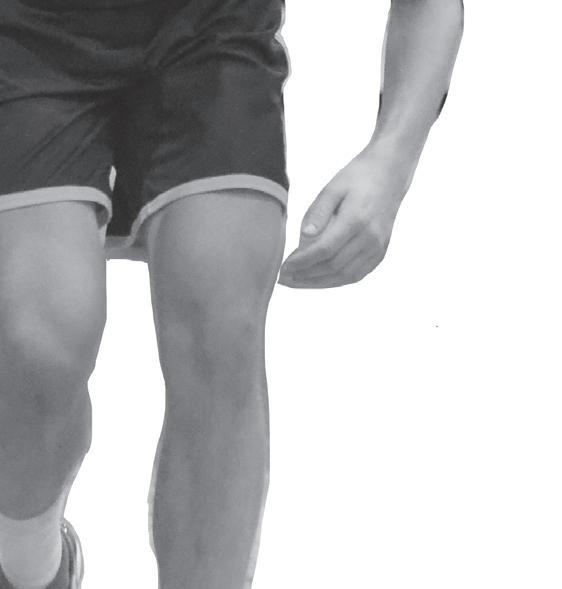









“These seniors have taught me so much, and have definitely put us in a good position to succeed in future seasons,” Bennet said. “They always tell us how to run the game and how to control the floor when you get put in. They will always be a part of our family.”
team


kings had a successful season, going 12-6 in pre-season play and 4-6 in Bay League play. The Vikings will go into next season losing three key starting seniors: Luke Hecht (’24), Anton BergeWells (’24) and Holden Hendrickson (’24). Most of the players on the Samo roster are currently juniors, who have all gained advice and guidance from their upperclassmen. Zachary Bennett (’26), a key player this season for his great defensive plays, shares his experience.
The future of Samo basketball is in question now more than ever. Recently, Coach Hecht surpassed the milestone of 500 wins in his high school coaching career, but what’s next?
Now, both of his sons, Josh Hecht (’23) and L. Hecht, will be out of high school and moving on to play in college. Team Captain L. Hecht shares his thoughts on the season.








was hanging out with the team and being around the

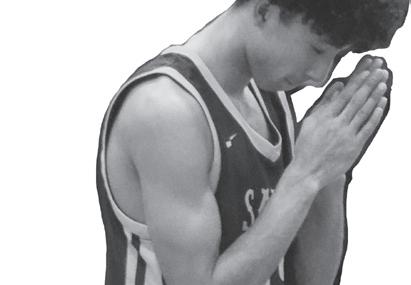



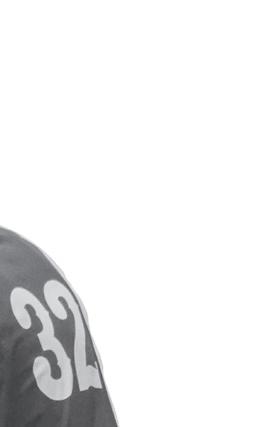
thesamohinews@gmail.


to guys.”


During his time here he earned Samo two CIF Championships and two State Championships.
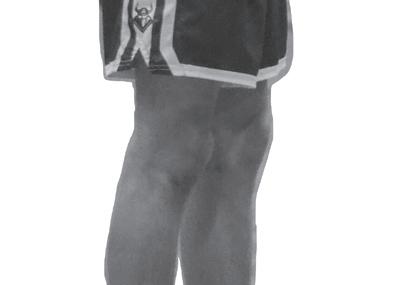

High School, ending in a 2-2 tie.
However, Samo advanced to the first round of the Division I CIF Championships, which extended their season.
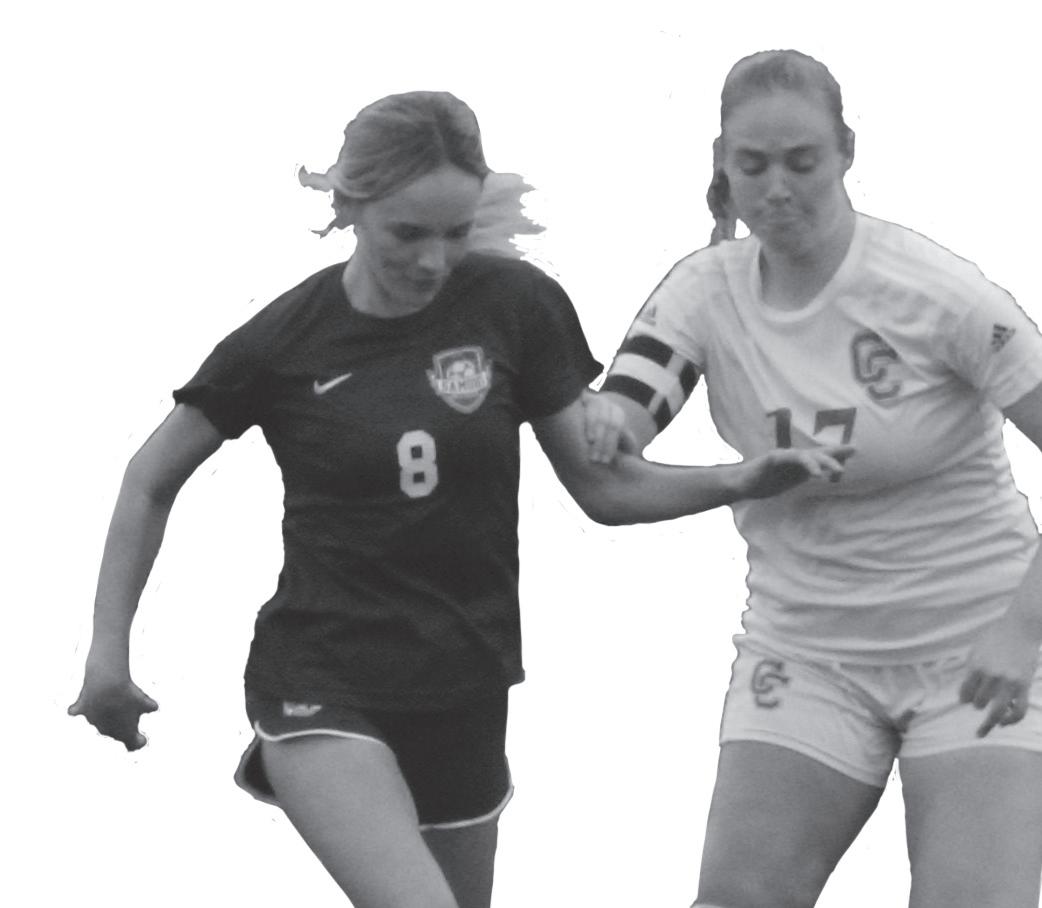

ships, which extended their season. which in you in.
“I wasn’t too happy with the outcome of the season but life goes on,” L. Hecht said. “Feel like we could’ve made more noise, but in the end it came down to our mistakes. Best part of the season
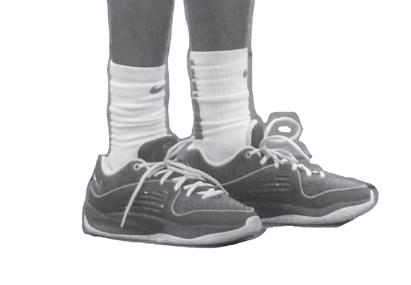
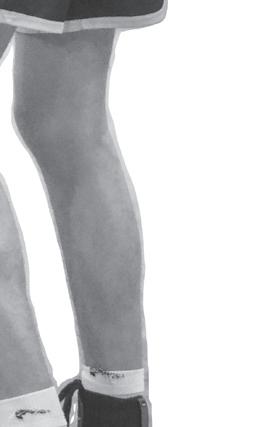



Girls’ soccer eliminated in first round of CIF
team’s current national rank is 181st, and they are ranked 67th in California. Howard recalls the highlights of her season.

thesamohinews@gmail.com


Audrey Howard (’26) discusses her thoughts on the season..

“This season, we lost many players due to injuries which set us back a bit,” Howard said. “However, I think that we put in a lot of effort to still try our best with a small roster, and we still qualified for CIF, which was very exciting. I think the team worked really hard and showed a lot of effort at each game, but we could improve on working together as a whole.”




Samo played against Harvard Westlake on Thursday, Feb. 8, in the first round of CIF Division I Playoffs.
However they lost with a 0-4 score and will not be advancing any further. Overall, they had nine wins, nine losses, and two ties this season. The
“Being a sophomore on the varsity team is really fun. It allows me to become friends with the upperclassmen and challenges me to compete against older and stronger girls,” Howard said. “My favorite game this season was playing against Peninsula because more than half the team got yellow cards and we beat them.”






“Well the season might’ve not gone as smoothly as we’d hoped, but it was fun,” Ryf said. “Pre-season was probably our high-




Some of Samo’s top players included Kayla Yee (’26) for most goals and Thalia Ryf (’24) for most assists; Brianna Bautisa (’24) came in second for goals and Rhian Bruce (’25) for assists. Though the team didn’t go as far as they’d hoped in the CIF Championship, every member kept their spirits high throughout the season. Samo’s team worked on team bonding and building community, as shown when the team qualified for playoffs. Ryf gives her insight on her last season playing for Samo.

A deep dive into the girls’ waterpolo 2023-2024 season
toward paid off especially well during their Jan. 25 Bay League win against Culver City, which would later be reflected in their final League win against the same team.
sounded, we were playing as a team and our hard work over the season was paying off,” Linowes said.
Samo’s Varsity Girls’ Water Polo closed out their season on Jan. 31 with a game against Culver City. Winning 8-1, the score reflected the effort the team has put into practice throughout the semester.
To total up the season, the Vikings hold a win-loss total of 9-14, with a 2-6 record for in-league games. From their first game of the season with a 17-14 win against Garden Grove, the team worked to improve in-game communication and awareness in the pool.
17-14
Head Coach Matthew Flanders goes in-depth on the development he is hoping for in future seasons.
“We are beginning to gain the experience needed to play the sport at a competitive level,” Flanders said. “We need to improve our fundamentals and knowledge of the game to win more games next year.”
The strengths that Samo worked
According to Team Captain Sarah Linowes (’24), players had become more confident in shooting, more adaptive in communication and better at defensive strategies. Linowes describes the mental readiness of the team as
one of the forces leading them to victory.
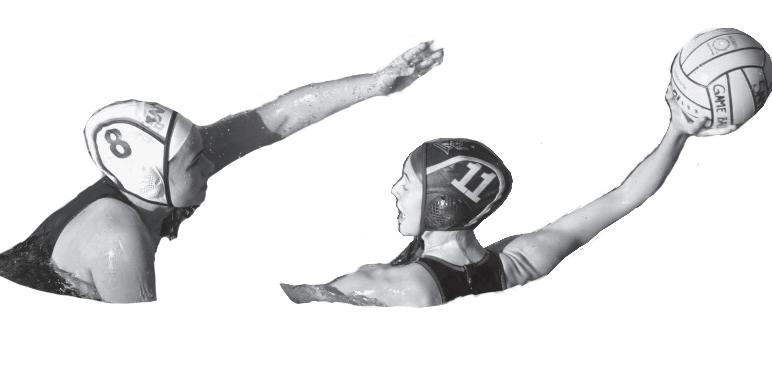
Flanders, as well as Captains Linowes and Gigi Slavonia (’24), highlighted team members Serena Wu (’25), Mila Rudgard (’24) and Sydney Schaffer (’24) as integral players this season. Wu stood out for her speed and talent for both defense and offense; Rudgard and Schaffer stood their powerful shots and dedication the sport. Flanders touches on the contributions that each player gave to the team as it related to their overall strength.
“The minute the whistle both out for to worked
“[These players’] hard work and leadership really pushed the other girls on,” Flanders said. “All of the girls had a great attitude and worked hard.”
thesamohinews@gmail.com
February 14, 2024 The Samohi 14
Samo Varsity Boys’ Basketball looked to face Westlake League win over
of 49-71 despite
Samo’s Varsity Girls’ Soccer
had their senior night on Jan. 31 against
light, [as well as] beating Peninsula [for the second time] on Jan. 16.”
Emi Yamashiro-Hergert Student Life Editor
Culver City
L.
Max Kehoe Staff Writer
Sports
Girls’ basketball looks to improve in the o season
The Samo Varsity Girls’ Basketball team brings their 2023-2024 season to an end, finishing sixth place in the Bay League.
Samo put up a fight in every single game against other highly ranked teams, as most of their losses were by a very narrow margin. This season the girls continued to prove themselves by showing their competitiveness and strong team work. They are hoping to improve for next year’s season and use this year to continue to help them get better. Head Coach Lance Radford shares his thoughts.
“Although we had a challenging season I am very proud of all of the girls,” Rad-
Boys’ soccer
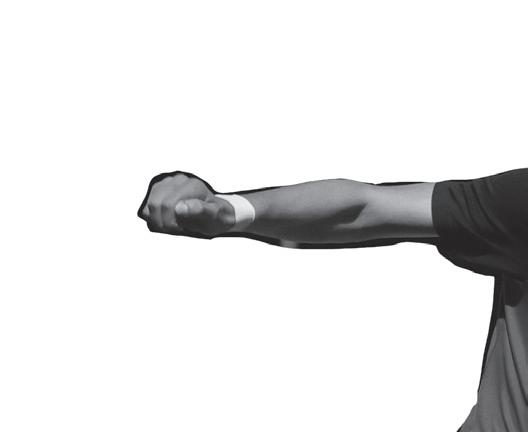
ford said. “We made progress, improved aspects of our game, and we are looking forward to the offseason to put in work to get better every day.”
Samo played its last home game, its senior night, against Redondo on Jan. 26. The team celebrated each senior on stage and introduced them and their family members to the crowd. Although they lost, Samo fought Redondo with teamwork and determination. While the team highlights working together and communicating, there were standout players on the court. One player that stood out the most was Kyla Cotton (’25) because of her amazing runs and defense. As a starting player for the Girls’ Varsity Team, she
shares what she thought of the season.
grew






“This season was definitely a learning experience,” Cotton said. “I really enjoyed working with these girls as we grew together, learned how to work with each other on the court and overall got closer as a team.”



thesamohinews@gmail.com
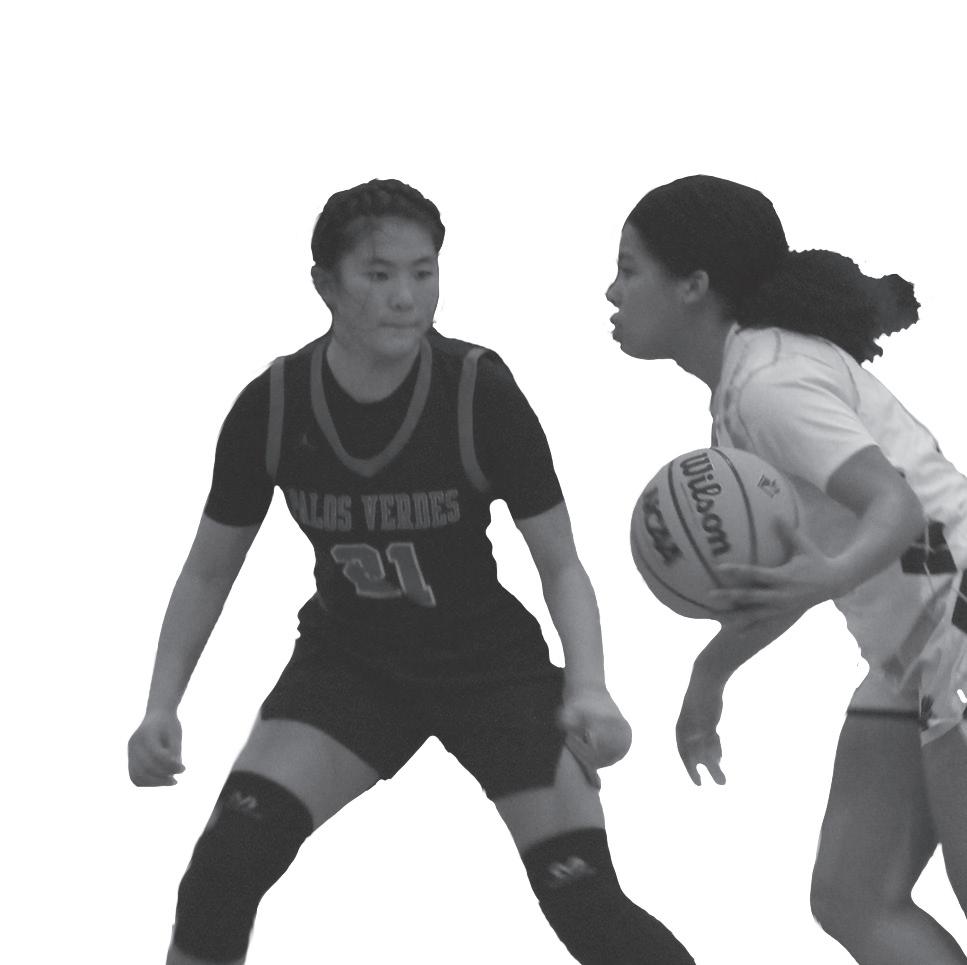

ends with a “carefree” win against Culver City
The Varsity Boys’ Soccer 2023-2024 season finished just as it began: with a win. In the span of two months,
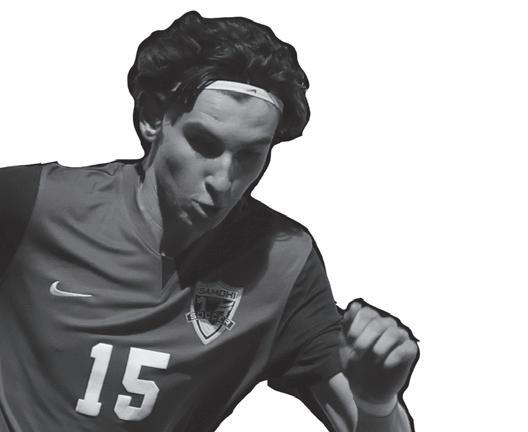



Boys’ Varsity Soccer won 5-0 at La Puente on Dec. 4 and 3-2 at Salesian on Dec. 6 the next week. On Dec. 9 the team won 1-0 against Ventura and 2-1 against Redondo Union in a tournament.
This season, the varsity team wasn’t afraid to experiment with new lineups; Head Coach Chris Sanodoval frequently toyed with his players’ formations, a gamble that kept the team on its toes. The effects of this were seen as the team exceeded the national average this year with a total of 35 goals. Decon Miller (’26) speaks on how the team came together to achieve this.
“I feel like the bond between the team was a lot better than last year,” Miller said. “Everybody kind of liked each other more.”

omores, so the core of the team should be there in the future next year,” Howard said. “I think it will be good.”
That is not to say that the team’s underclassmen did not excel as well: Miller was ranked in the top 15 of his division in the assists category,





they’ve faced losses, took risks and made long schools across SoCal. Subsequent to their
initial win of 4-1 on Dec. 1 against Beverly Hills, the
varsity team soared, riding the wave of their success
into the following matches.

No longer burdened with the pressure of securing a win, Boys’ Varsity ended their season on a high in their final game against Culver City on Jan. 31. The outcome of their performance irrelevant, the team was able to truly let loose on the field, and ultimately secured the win with a score of 2-1. Team Captain Jesse Howard (’24) describes the team’s success in this game.
Jesse assists with 6 prominent assists throughout the season from his position in midfield.
“We were kind of playing for the first time all season where we were able to play carefree and enjoy it,” Howard said. “It was fun because without the pressure we could just do our thing and kind of take risks and [we] scored some nice goals from far.”
With 14 players graduating this June, it’s safe to say that we can expect a different team next season. Captains Dylan Galperin (’24), Manu Castagna (’24), Atreyu Lucas (’24) and Howard will retire as Samo athletes, and the team will have to bid farewell to some of their most treasured teammates and leaders.
“We definitely do have some younger players, like a freshman on varsity and some good juniors and soph-
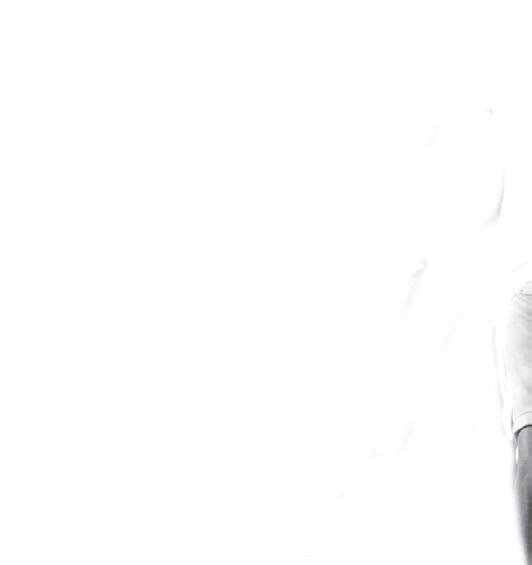
thesamohinews@gmail.com




Samo wrestling sends eleven qualifiers to CIF
The 2023-2024 wrestling season is coming to a close. Samo’s wrestlers have seen many wins this season and are looking to continue their streak into CIF. Varsity boys and girls had eleven people qualify for CIF, including six champion wrestlers: Raden Madley (’25), Toby Safchik (’25), Oscar De La Torre (’24), Cameron Gorbani (’24), Mason Oliva (’24) and Arata Sakamoto (’26). Oliva and Girls’ Team Captain Alicia Lewis (’24) are both returning CIF placers.
“I think the highlight of the season is beating Culver City,” Miller said. “For me personally, [it is] scoring against Mira Costa.” seen Arata team,
a surgery for a torn meniscus. After a long hiatus, he returned to the mats in January and won his match in the Bay League. As a team, Samo won 66-18, displaying the wrestlers’ hard work. De La Torre thinks back on on these results and looks
ward to upcoming competitions.
“I’m really happy with our performance this weekend and how we came back from the loss to Redondo at League Fi-





While there’s no guarantee of success in CIF, from how the wrestling team has performed so far they are expecting many triumphs in the near future. Varsity Boys’ Team Captain Oscar De La Torre took a break from the mats after









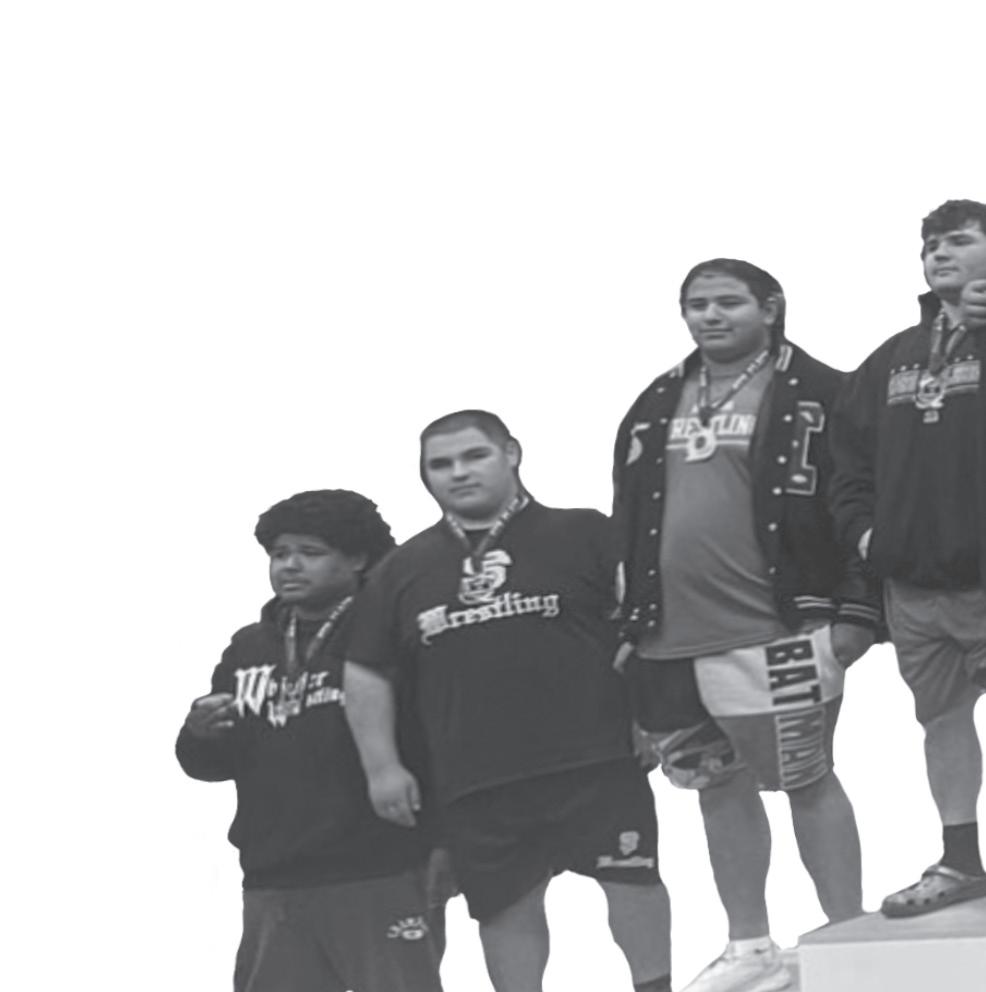






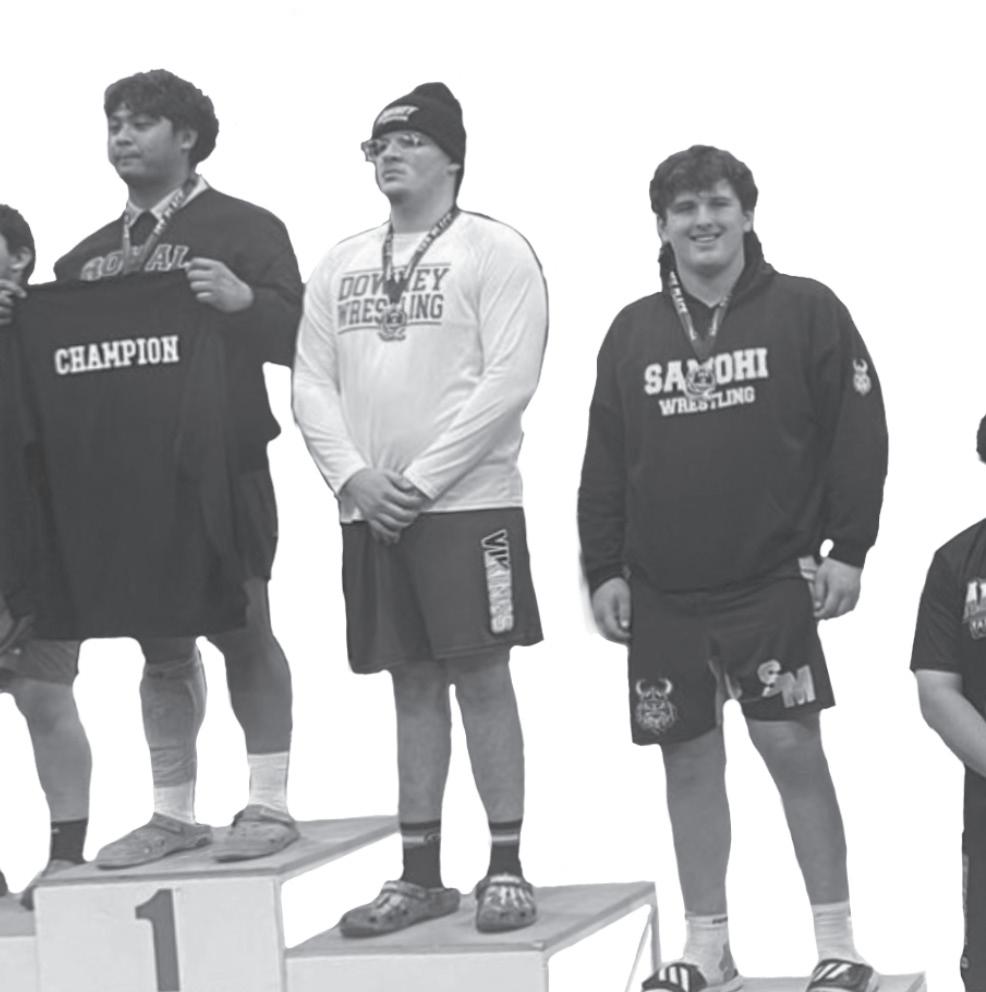

the majority of our lineup. We have a very promising season ahead of us and can’t wait to compete this weekend and qualify even more wrestlers to the [CIF] Masters Meet in Palm Springs two weeks from now.”







Alex Behm (’25), Fred Ekberg (’24), Oliva and Gorbani qualified for Day Two of CIF on Feb. 10. Oliva placed third, losing to the reigning CIF Champion in the semi-finals, but managed to qualify for the Masters Meet in Palm Springs, which will take place on Feb. 16-17. Head Coach Jason Mun reflects on the season.
the nals,” De La Torre said. “We won in team points at the tournament and qualified two but managed Springs, take on a flew is
“It’s been a fun year. Some seasons go faster than others [and] this one flew by, which is usually an indicator that we’re having fun [and] we’re finding success,” Mun said.











“It’s a joy to be here.” Mason Oliva will compete at the Masters Meet this weekend, Feb. 16-17 in Palm Springs.

February 14, 2024 The Samohi 15
Olivia Stephansen Staff Writer
Dalia Puchalt Staff Writer
Taylor Witt Photo Editor
for-
Sports
thesamohinews@gmail.com
 Photo by Manny Lopez
Cover by Taylor Witt
Photo by Manny Lopez
Cover by Taylor Witt































































































 Maggie Marks Staff Writer
Ryan Kim: eOutsiderS.E. Hinton
Maggie Marks Staff Writer
Ryan Kim: eOutsiderS.E. Hinton












 Dalia Puchalt Staff Writer
Dalia Puchalt Staff Writer

















































 Art by Audrey Strauss
Art by Audrey Strauss














 Addie Burns Staff Writer
Addie Burns Staff Writer

 Manny Lopez Staff Writer
Manny Lopez Staff Writer















































































